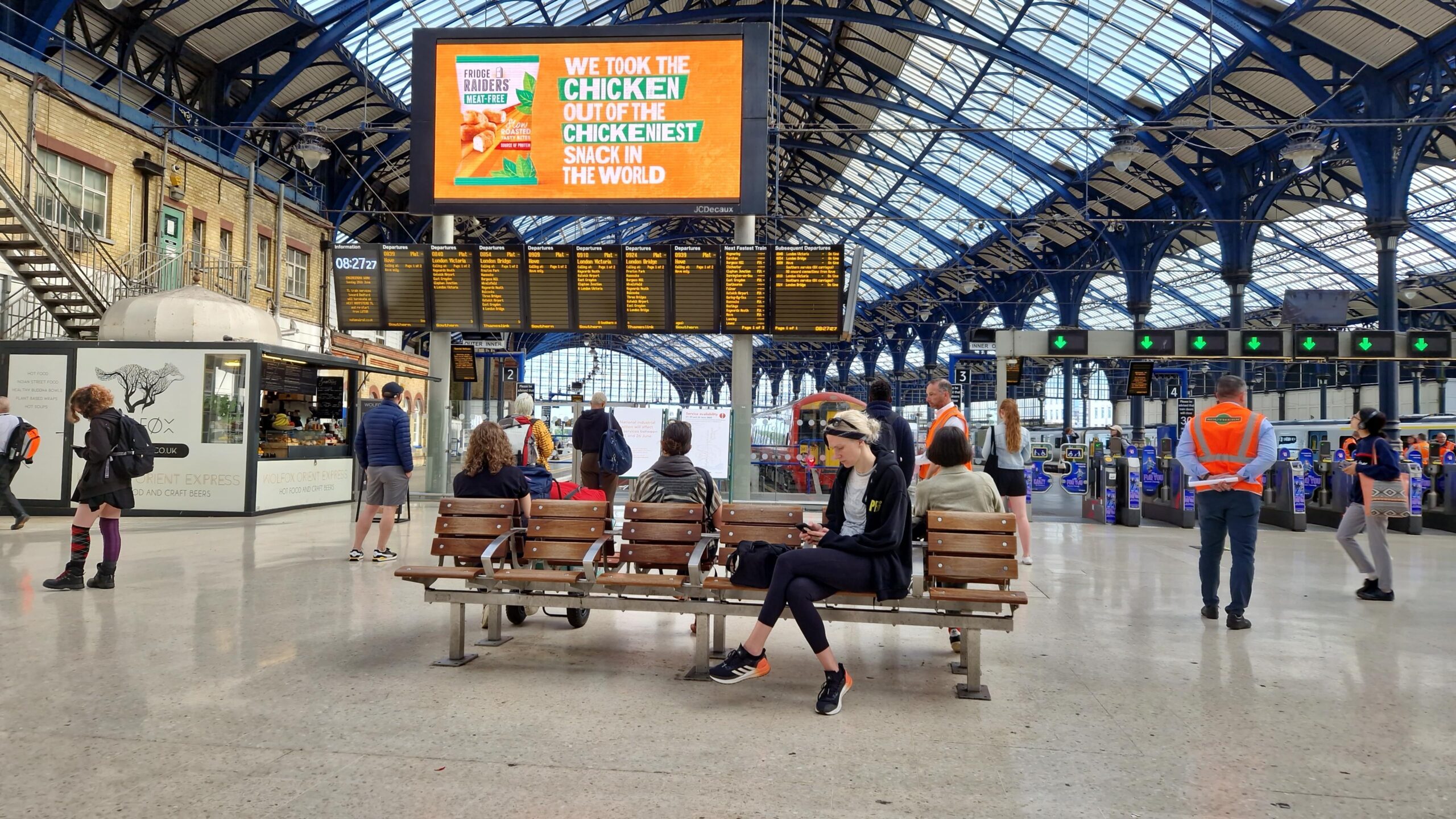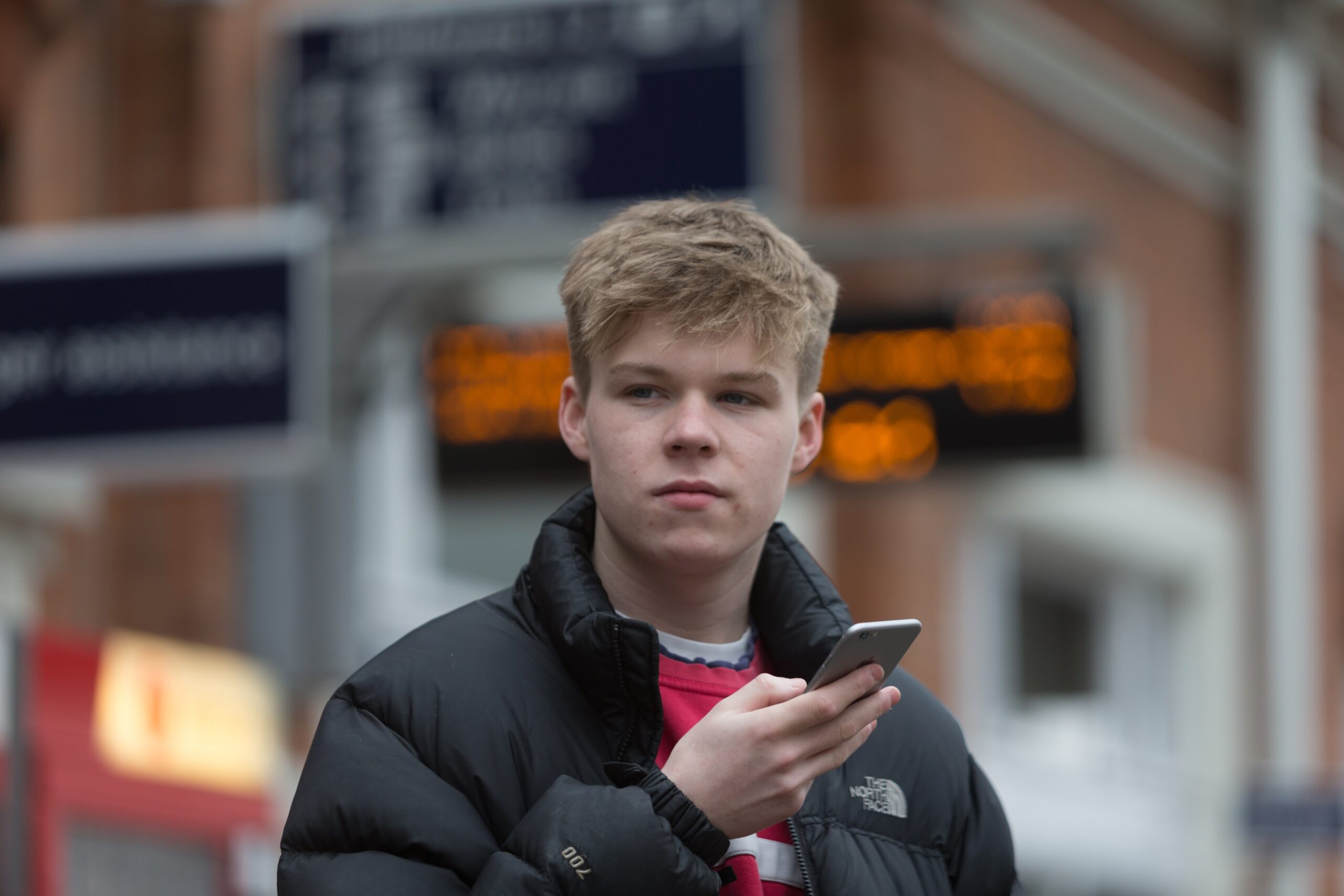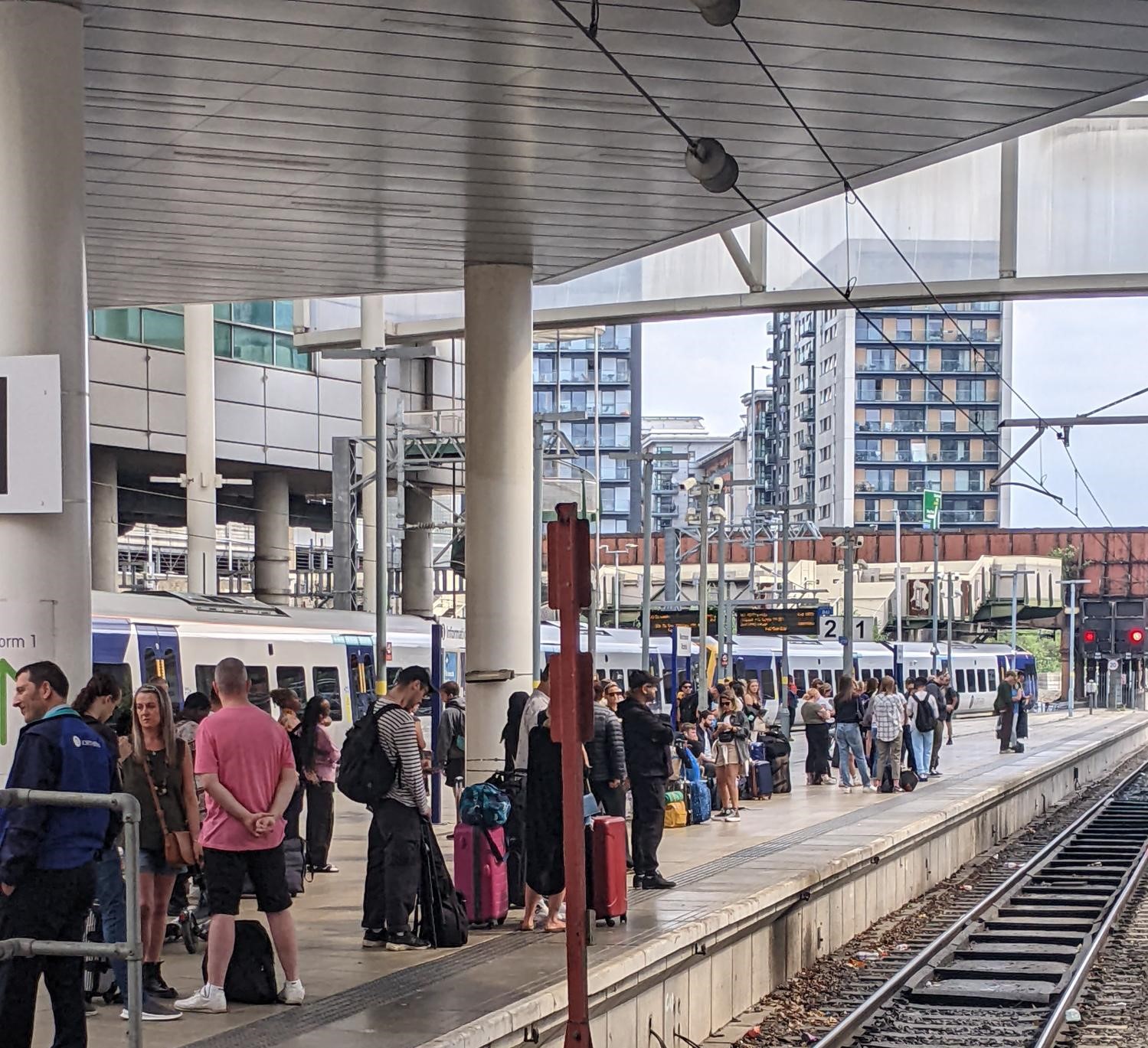
–
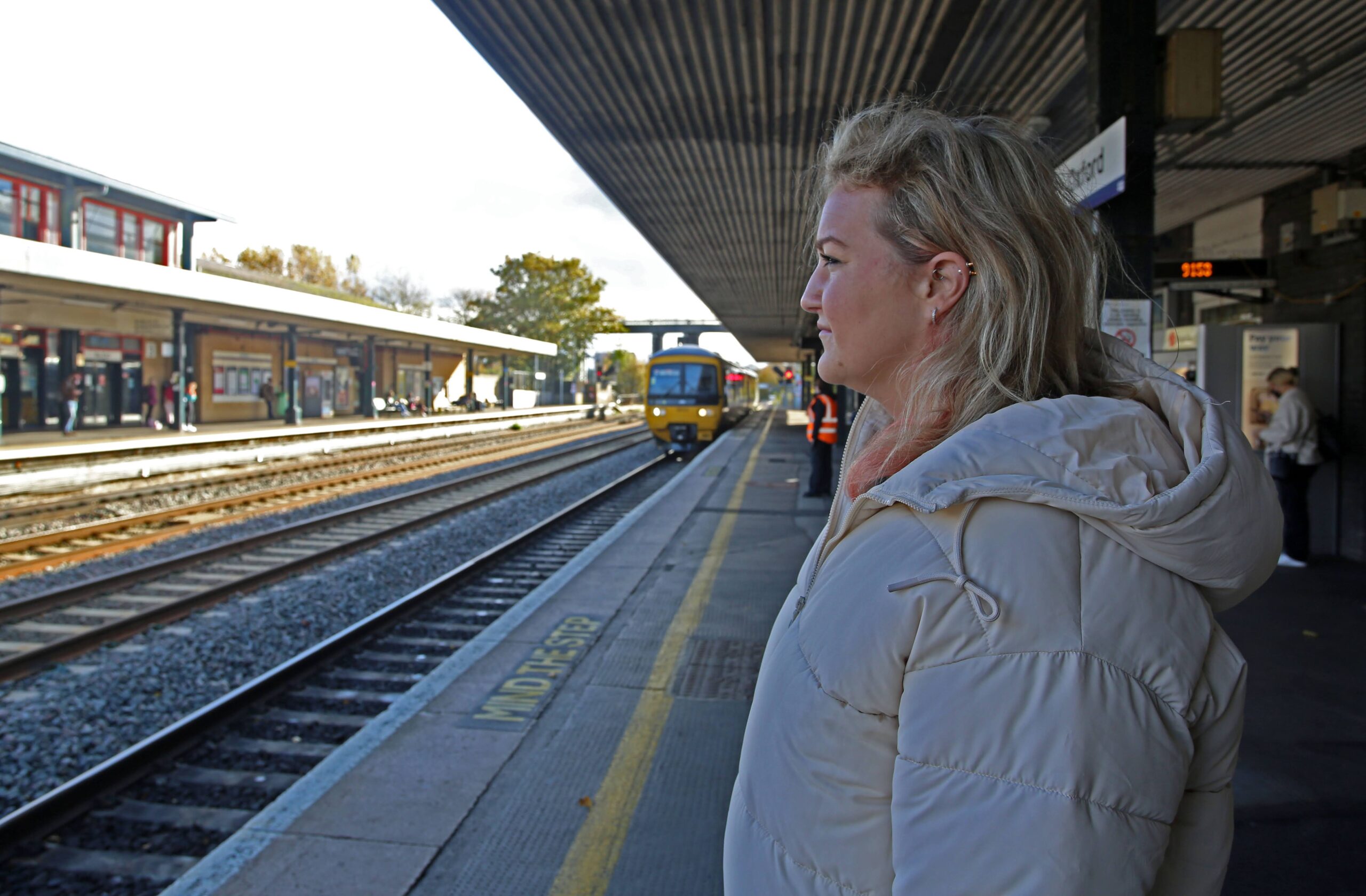
We spoke to a representative sample of people across Britain to find out how the upcoming strikes, impacting most train companies in England, would affect their travel plans between 12 and 14 May.
- Less than 6 in 10 people who intended to travel on 12 or 13 May were aware of the strikes on these dates. This is a lower level of awareness than before the previous rail strikes this year.
- The majority of those that had planned to travel on days affected by strike action say they will no longer do so, but around one in three still plan to use the train on strike days.
- Information ratings remain similar to previous survey waves. Just over half of people who had intended to travel between 12 and 14 May rated information about which train services were running as good. Half rated information about changing tickets/refunds as good.
Overview of passenger feedback
Updates from previous days
Friday 12 May
The first of three days of strike action by train drivers’ union Aslef (the others are 31 May and 3 June). Most train companies in England are affected, although ‘check before you travel’ is crucial – you might find your operator is running pretty much a normal service.
As well as surveying passenger awareness of today’s disruption (you can see the results here), Transport Focus checked the quality of information available to passengers. Despite almost a year’s ‘practice’, some train companies still haven’t got this off to a tee. Frustrating. We’ll be following up.
On the ground today, Transport Focus observed only a few passengers at Manchester Piccadilly – unsurprising with only the Transport for Wales trains (not affected by the strike) and a handful of Northern services running.
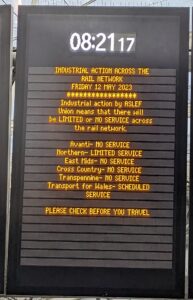
There was strong demand for the first train from Peterborough to London (not until 9.37am) today. Full marks to LNER for managing to run a few trains. Why aren’t other operators able to run at least a skeleton service?
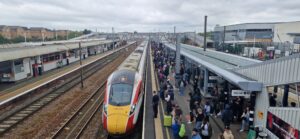
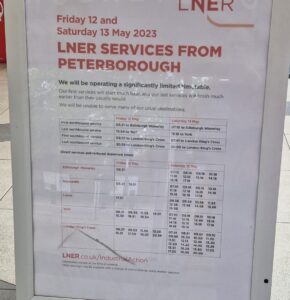
16 March 2023
Transport Focus has been out today checking the passenger information on the first day of the latest RMT unions strikes. Services across much of England are severely impacted today, while services within Scotland and Wales are largely unaffected.
At Peterborough some passengers were clearly surprised to discover they couldn’t get where they wanted to go. We’ve previously raised the need to improve information at stations so it covers the impact on all train services from that station, not just those provided by the station operator. On this occasion there was at least a large poster summarising the impact across the different train operators.
The 07:54 train from Peterborough to Kings Cross had a fair number of passengers, but with 12 coaches there was no need for anyone to stand. Unfortunately, at Kings Cross a recorded announcement warned passengers about the London Underground strike the previous day, an example of where much closer more attention to passenger information is required.
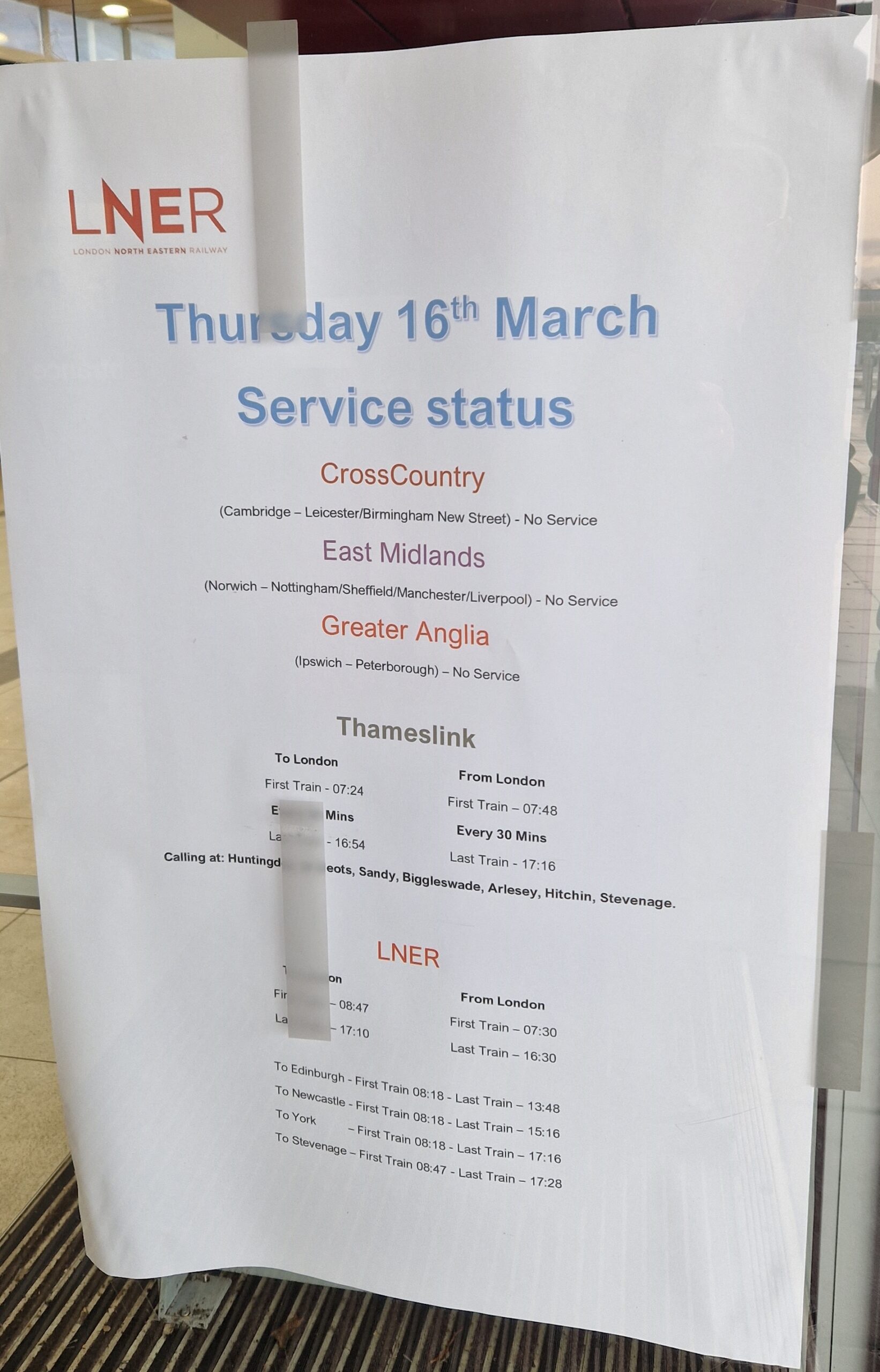
At Horsham and Littlehaven trains were still running and when trying to buy a ticket from the ticket machine there was a clear warning that there is strike action – both for tickets today and on Saturday. The first and last trains aren’t advertised but there were clear warnings about the service finishing by 7pm.
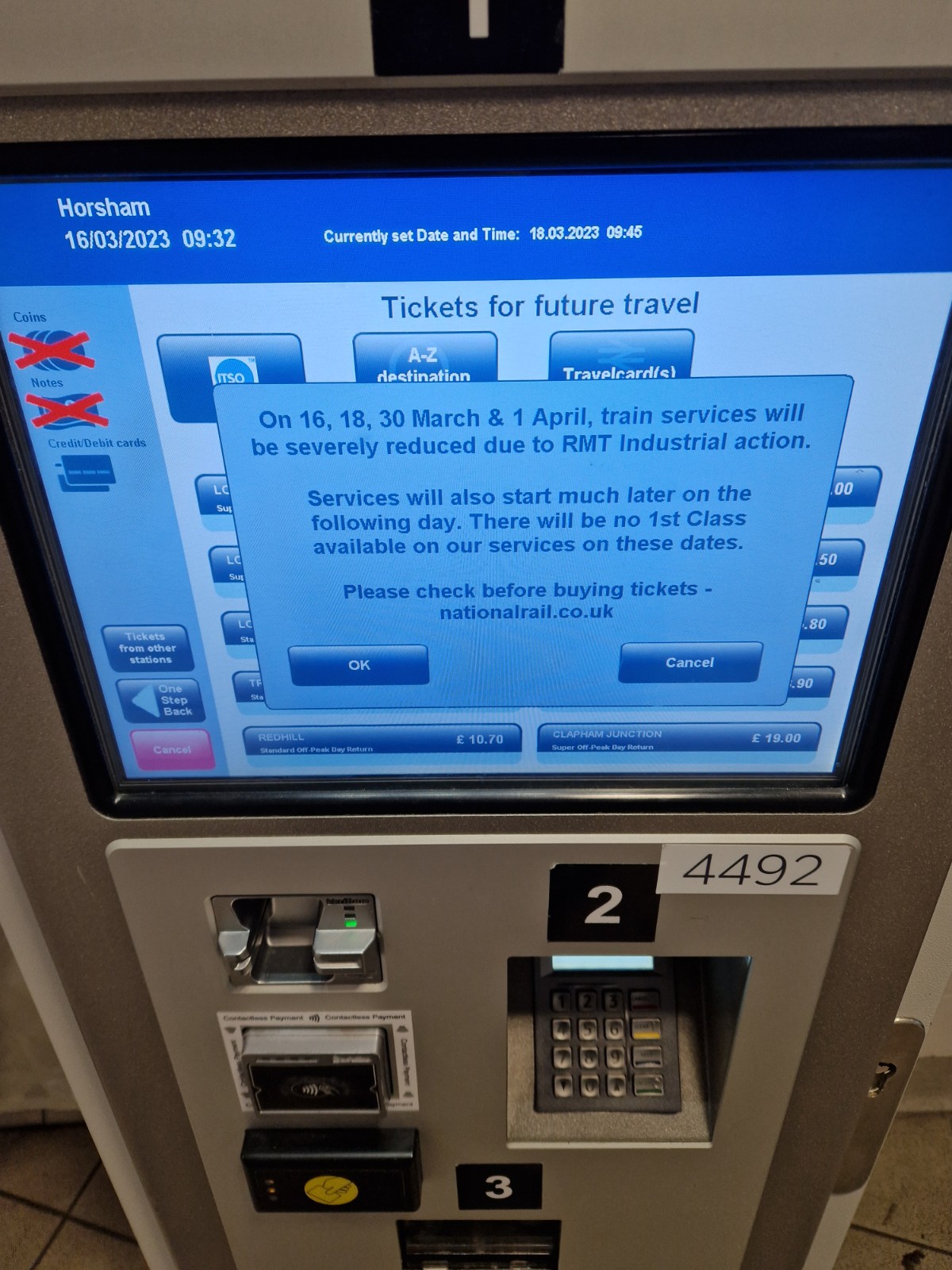
Manchester Piccadilly and Victoria stations were both very quiet. There were no signs about the strike action at the station entrances, but clear information on screens once inside, visible staff to help passengers and clear warnings to check trains were running before buying a ticket from a machine.
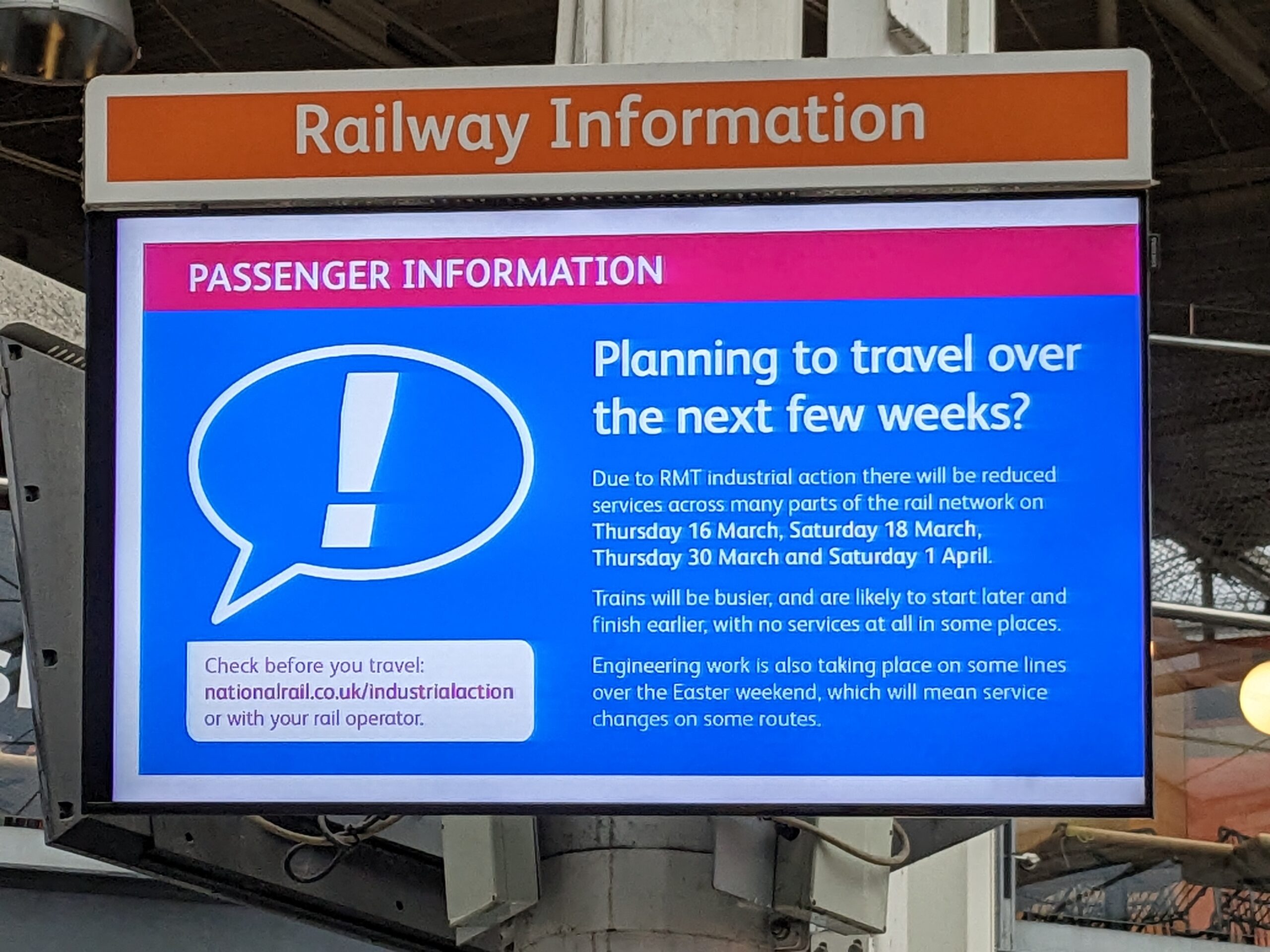
At Stafford yesterday, disappointingly there was no information to suggest there was a strike planned the next day, with no signage or announcements on the concourse. Basic A4 notices in the ticket office, just showing the strikes dates, were the only warning for passengers.
Elsewhere, at West Midlands Railway stations screens and notices were helping to warn passengers and at Birmingham New Street there was useful information for passengers planning to use the train to get to the races at Cheltenham. Again announcements seemed to be a gap, an important information source for everyone, but especially visually impaired passengers.
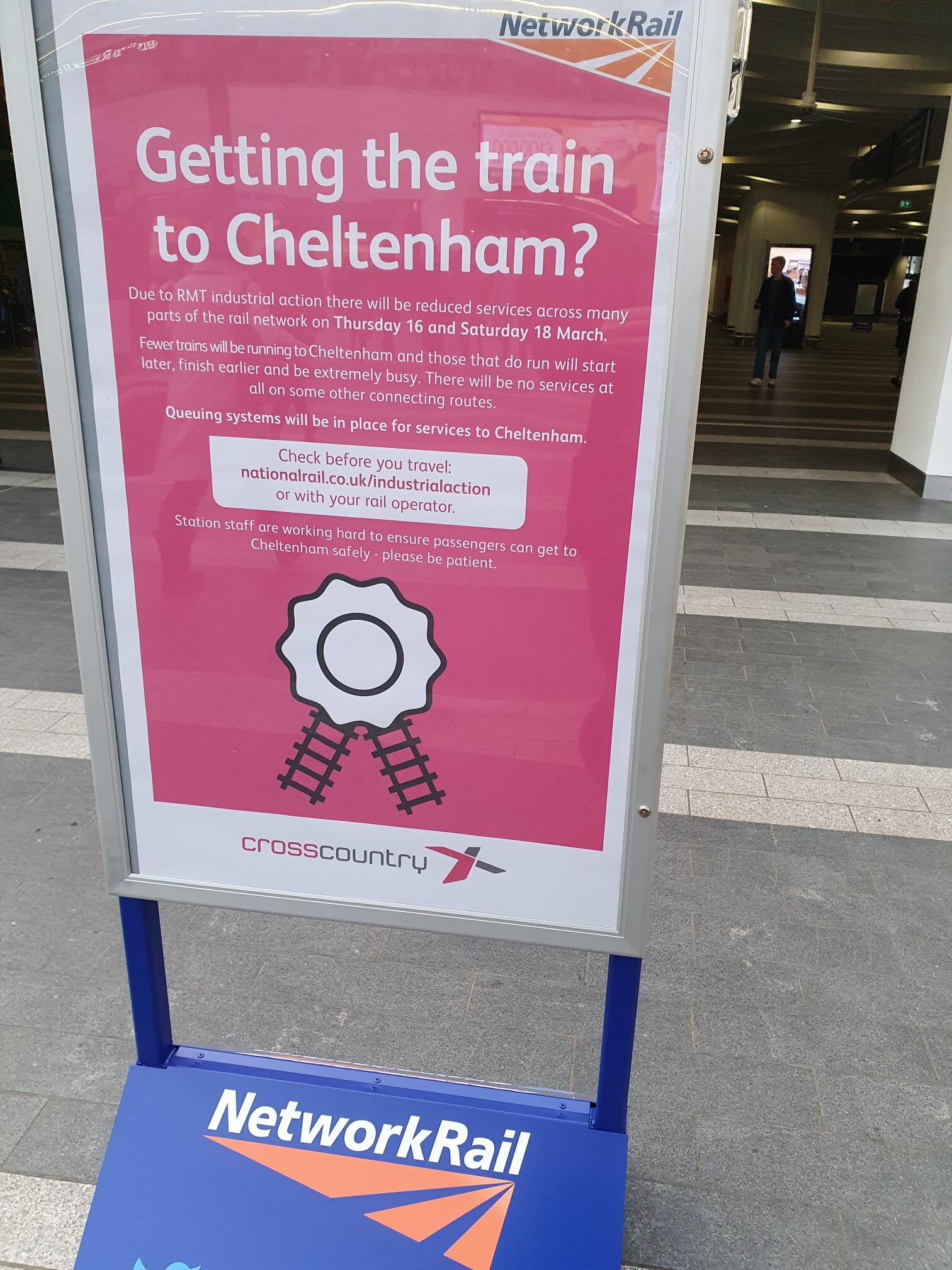
This snapshot of information about the strikes at stations today suggests provision remains very patchy. There’s welcome good practice, but also evidence of significant gaps and a need for the industry to ensure the basics are in place consistently across the network.
3 February 2023
Ahead of the two ASLEF strikes affecting most train companies in England this week, Transport Focus checked that information to passengers was clear.
We’ve challenged a few organisations to make things clearer still, but on the whole we felt that the information was ok.
This graphic used by West Midlands Railway and several other operators we felt made things clear for passengers.
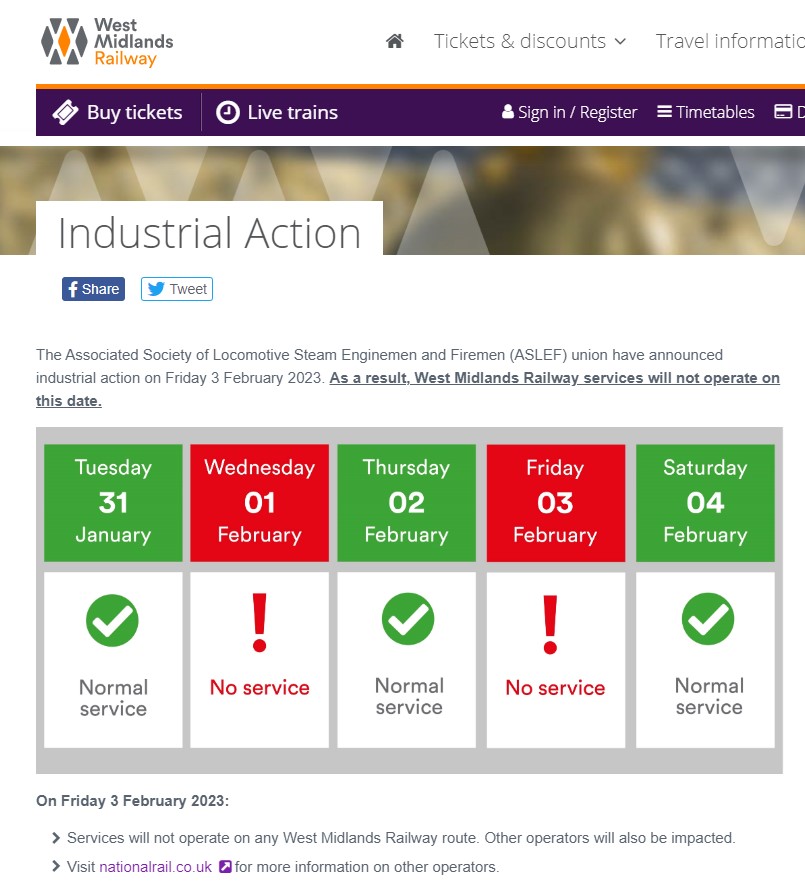
Southeastern had a clear statement on its homepage that it wasn’t running any trains today.
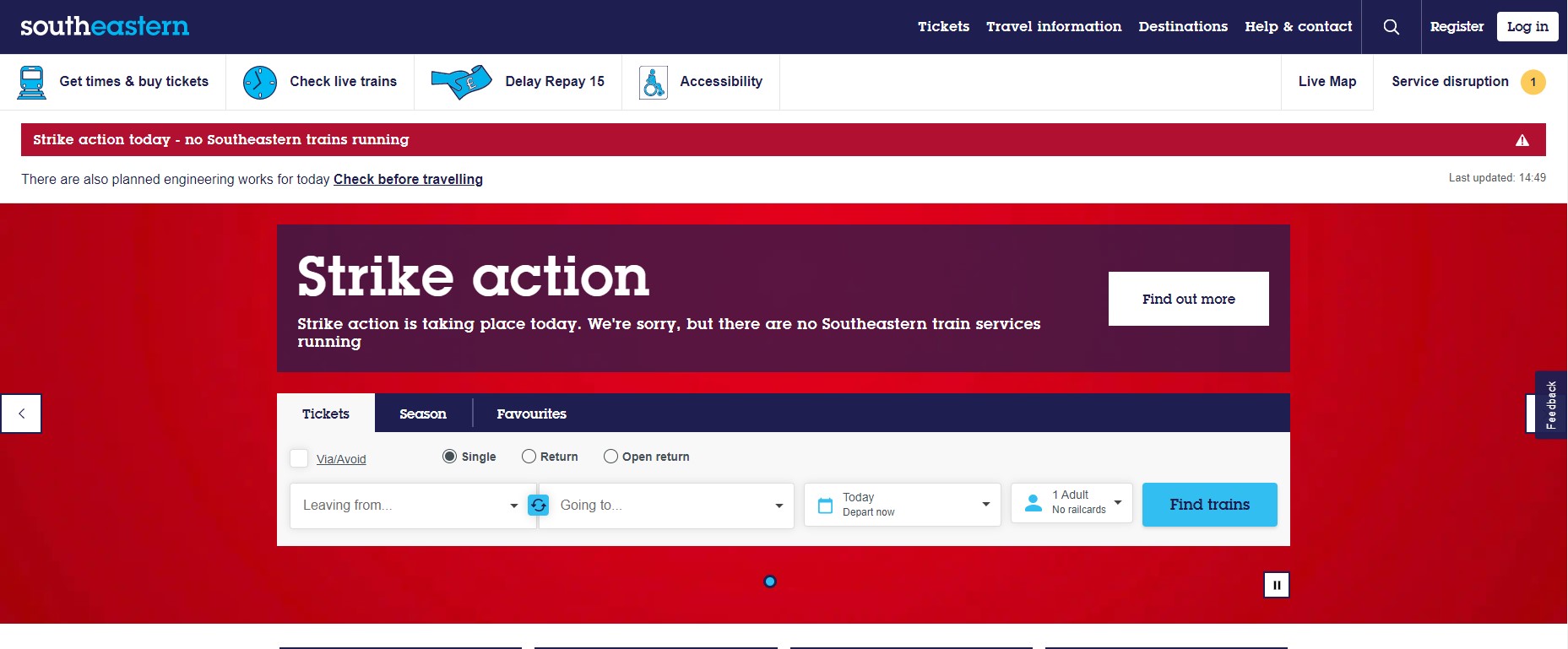
Trainline we felt could have been clearer that the railway in Scotland and Wales was largely unaffected.
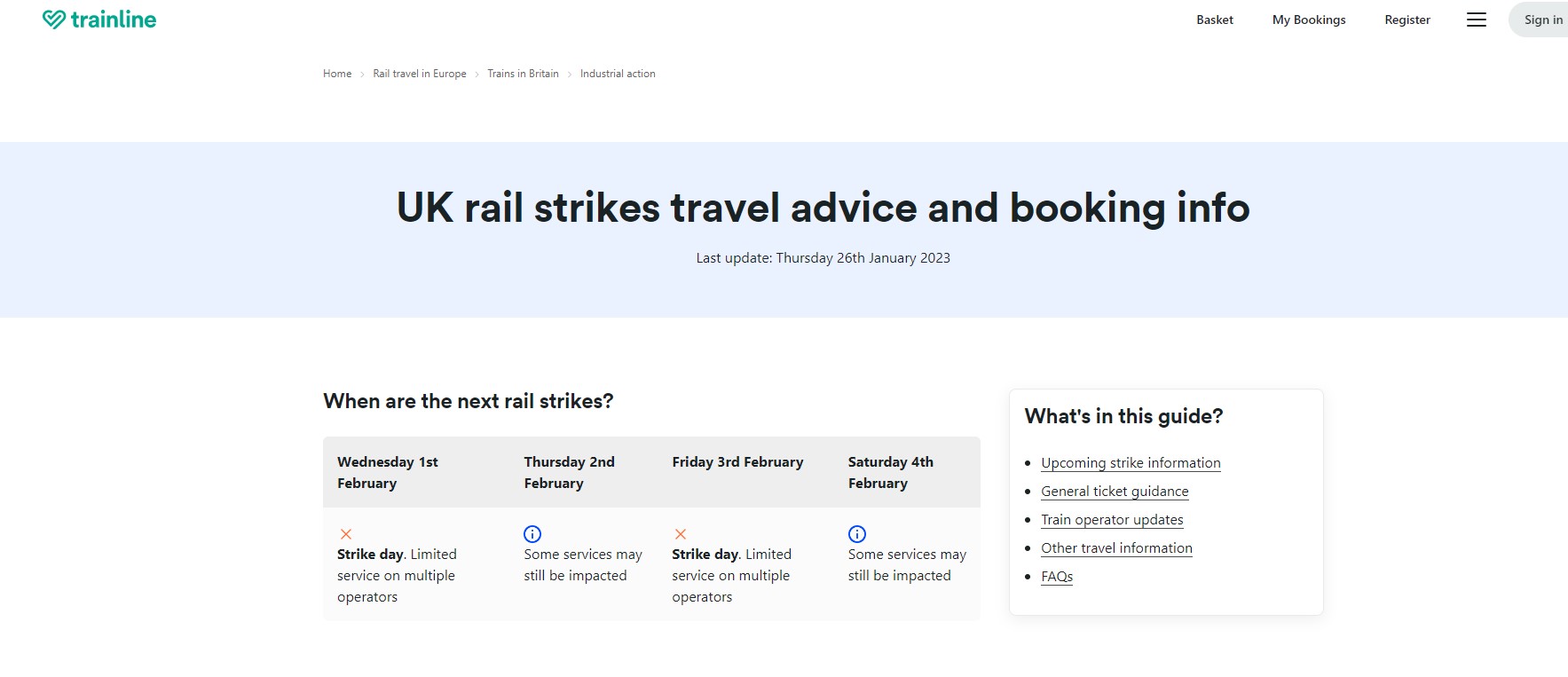
1 February 2023
Transport Focus was out and about today, the first of the two ASLEF union strikes across much of England this week – services in Scotland and Wales being largely unaffected.
Transport Focus visited London Bridge and London Victoria. There were no National Rail trains running from either station, with both physically closed and information clear within the London Underground stations.
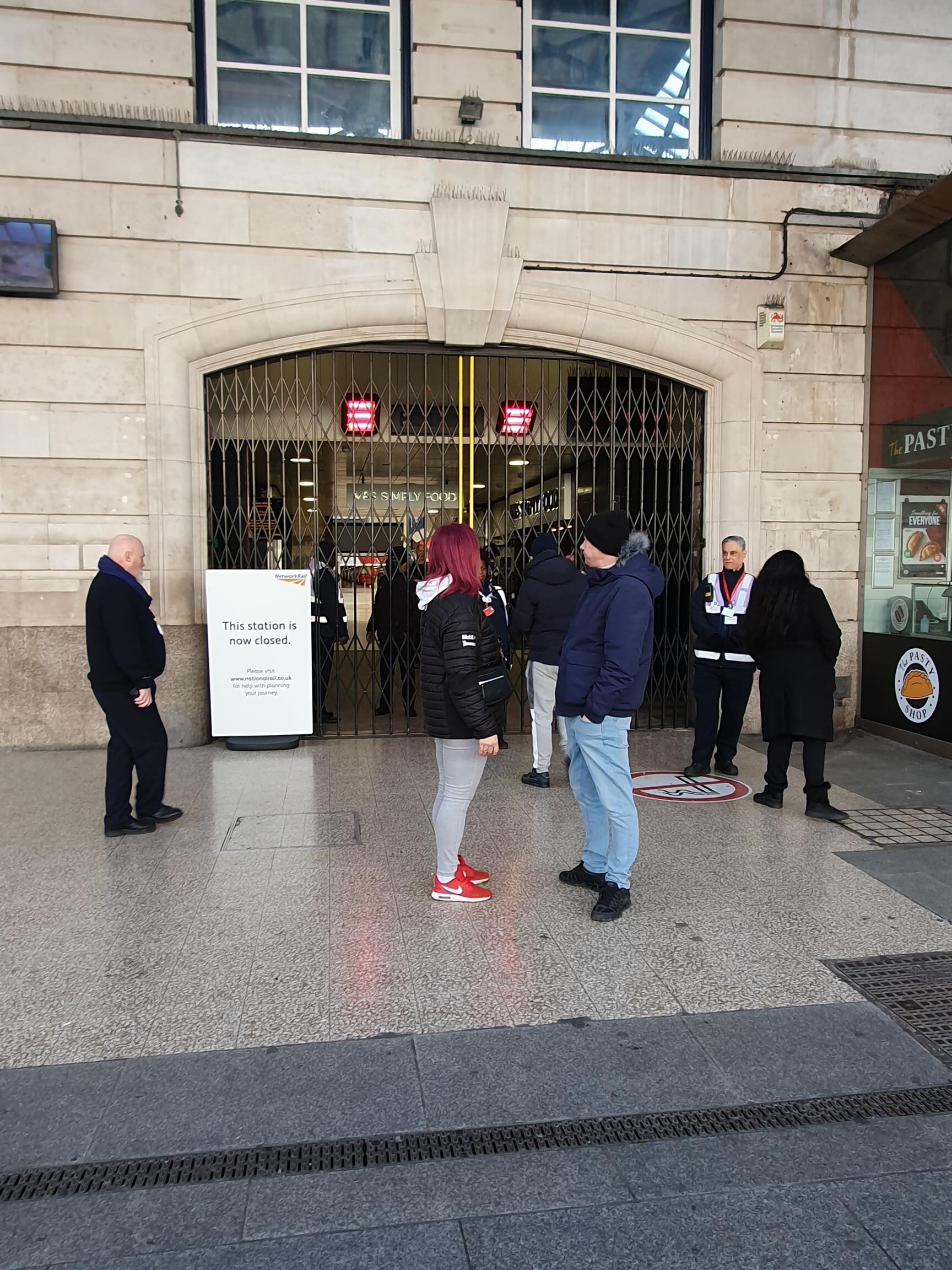
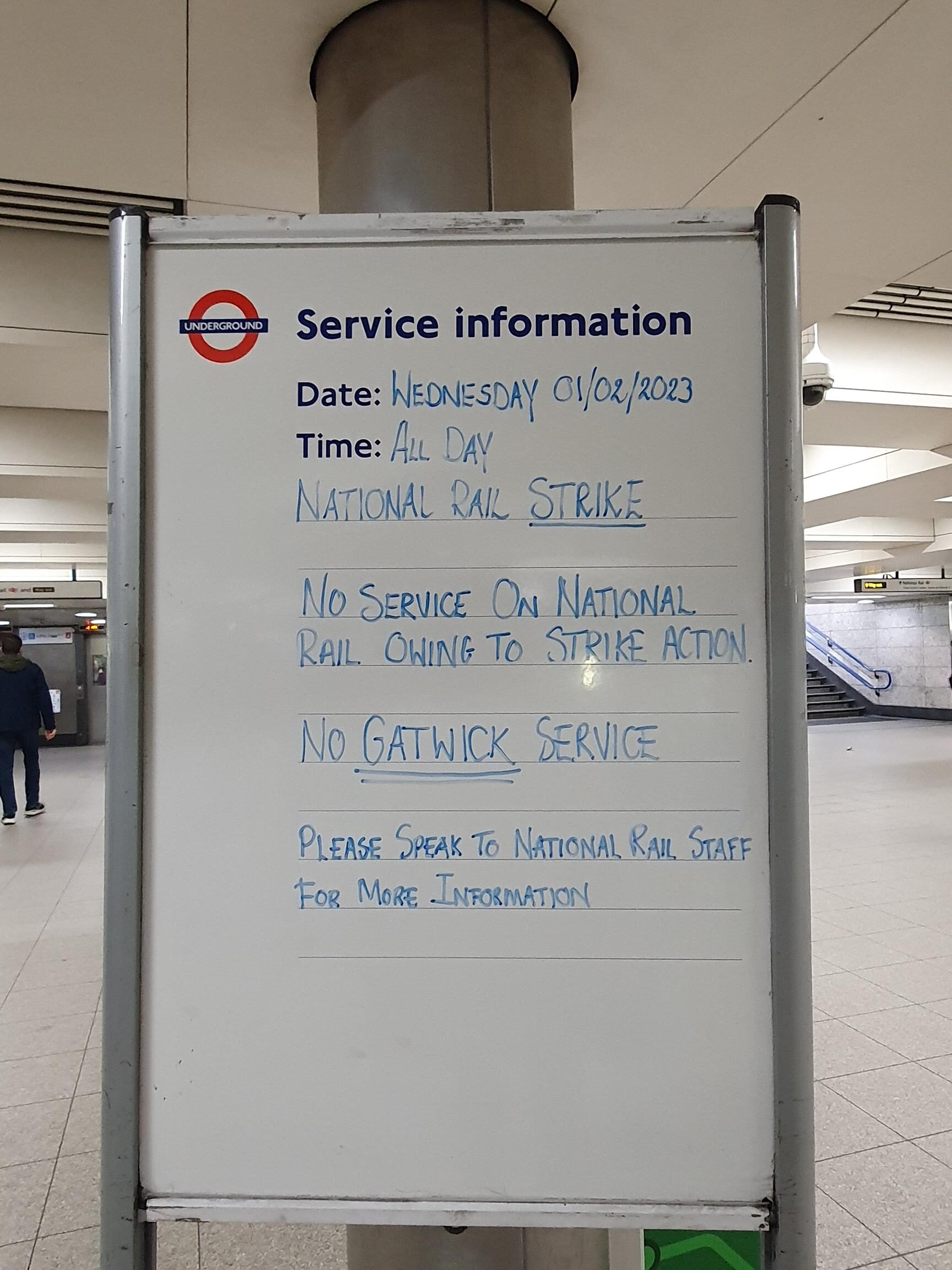
It was business as usual at London Waterloo station, as South Western Railway drivers were not on strike (except on the Isle of Wight). There were notices on ticket machines warning that other train operators weren’t running. Plenty of staff were on the concourse to help passengers with queries. The entrance leading to Southeastern’s Waterloo East station was also blocked off.
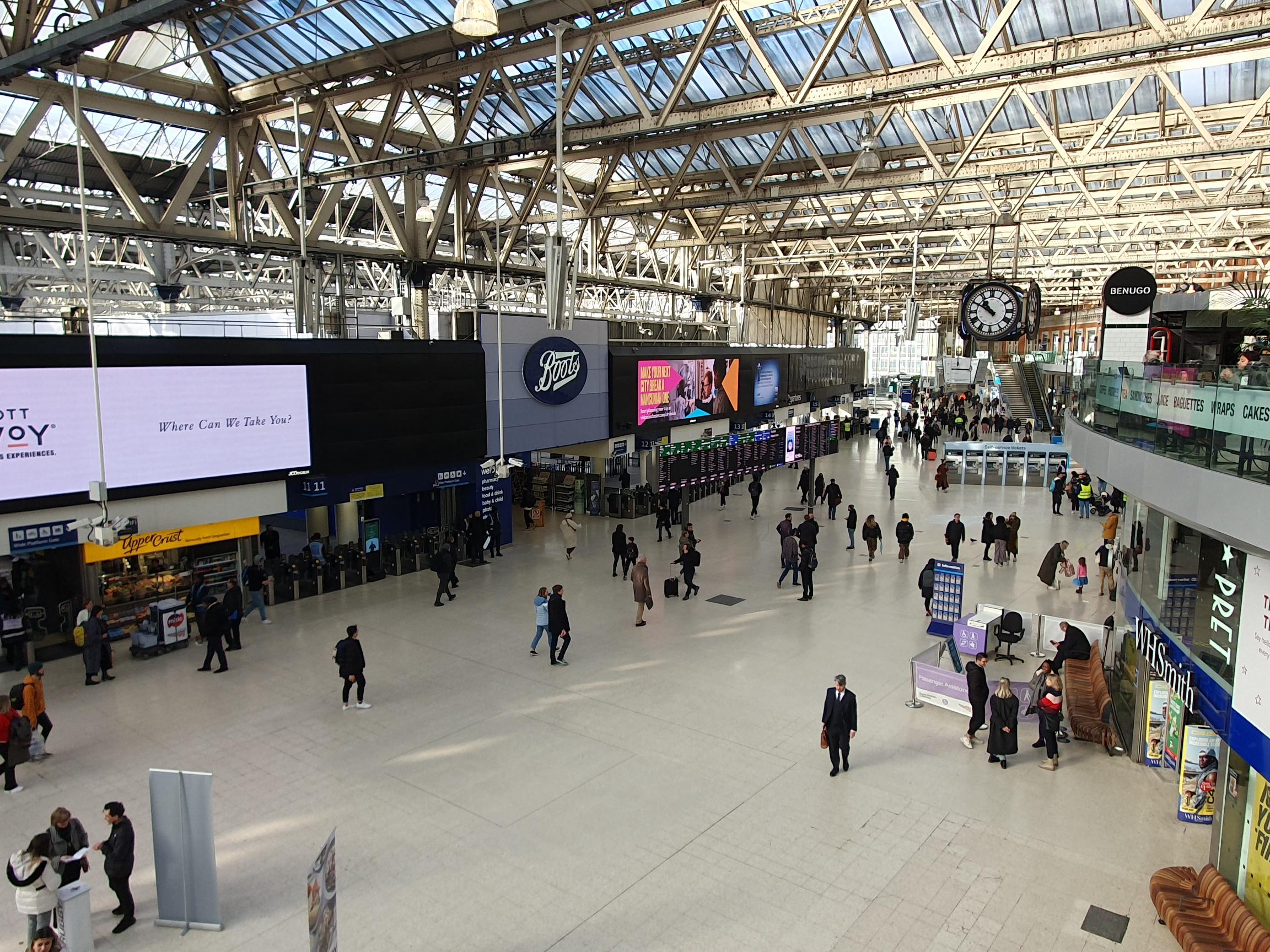
Transport Focus was also out looking at the impact on services and passenger information at Peterborough station. Only LNER was running from Peterborough, no Thameslink or east-west services. Plenty of people boarded the first train of the day, 0939 to Kings Cross. Grand Central services, unaffected by the strike, were also seen hurrying through to London.
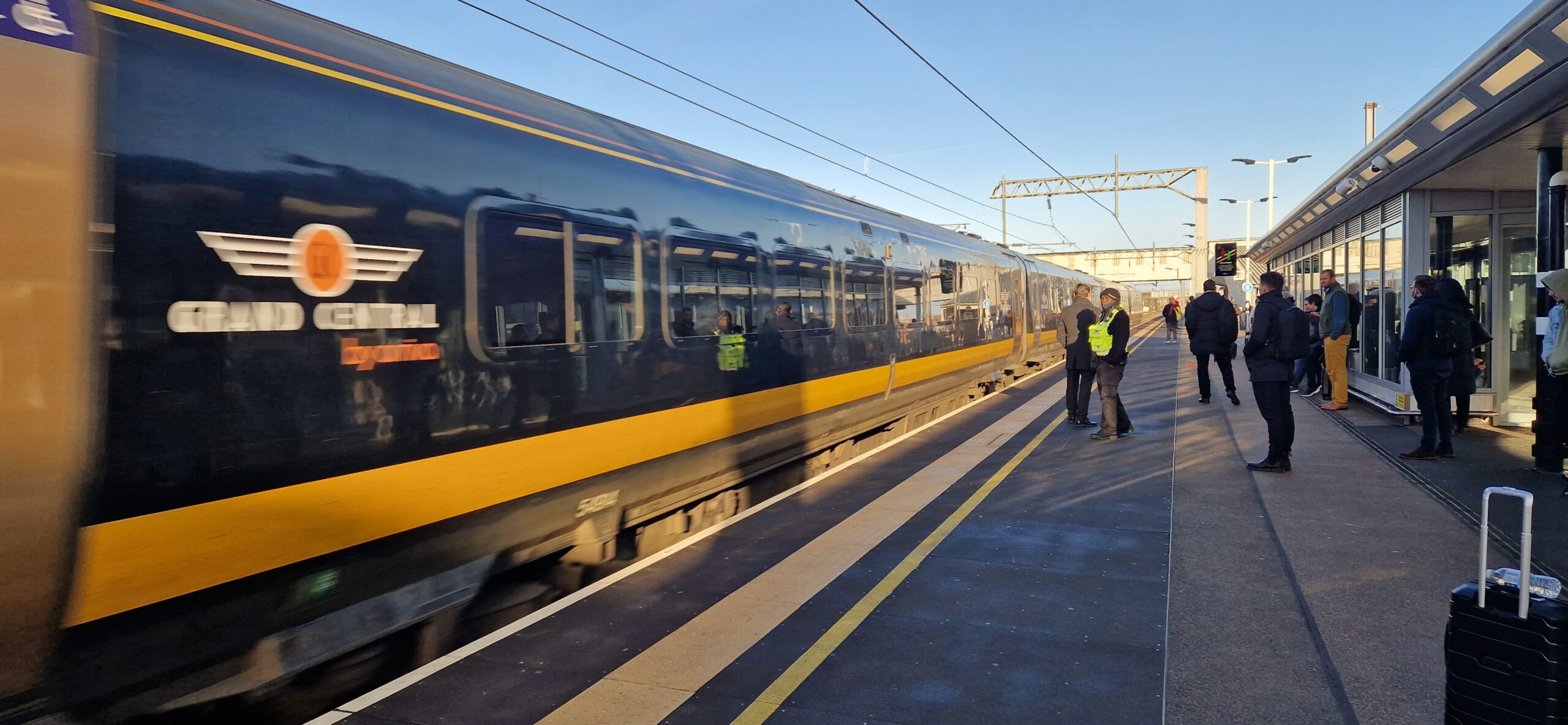
We’ll be watching to see the impact of the late start to services tomorrow, and the next ASLEF strike on Friday.
6 January 2023
Transport Focus staff were out and about today monitoring the impact on passengers of the latest RMT strike.
At London Liverpool Street we found it relatively quiet this morning. Many passengers had clearly heeded the advice to avoid travelling – and of course lots had no option because their station had no service at all. Those trains that were running were running on time, staff were on hand to give advice and notices were prominent reminding people about the much-earlier last trains home tonight.
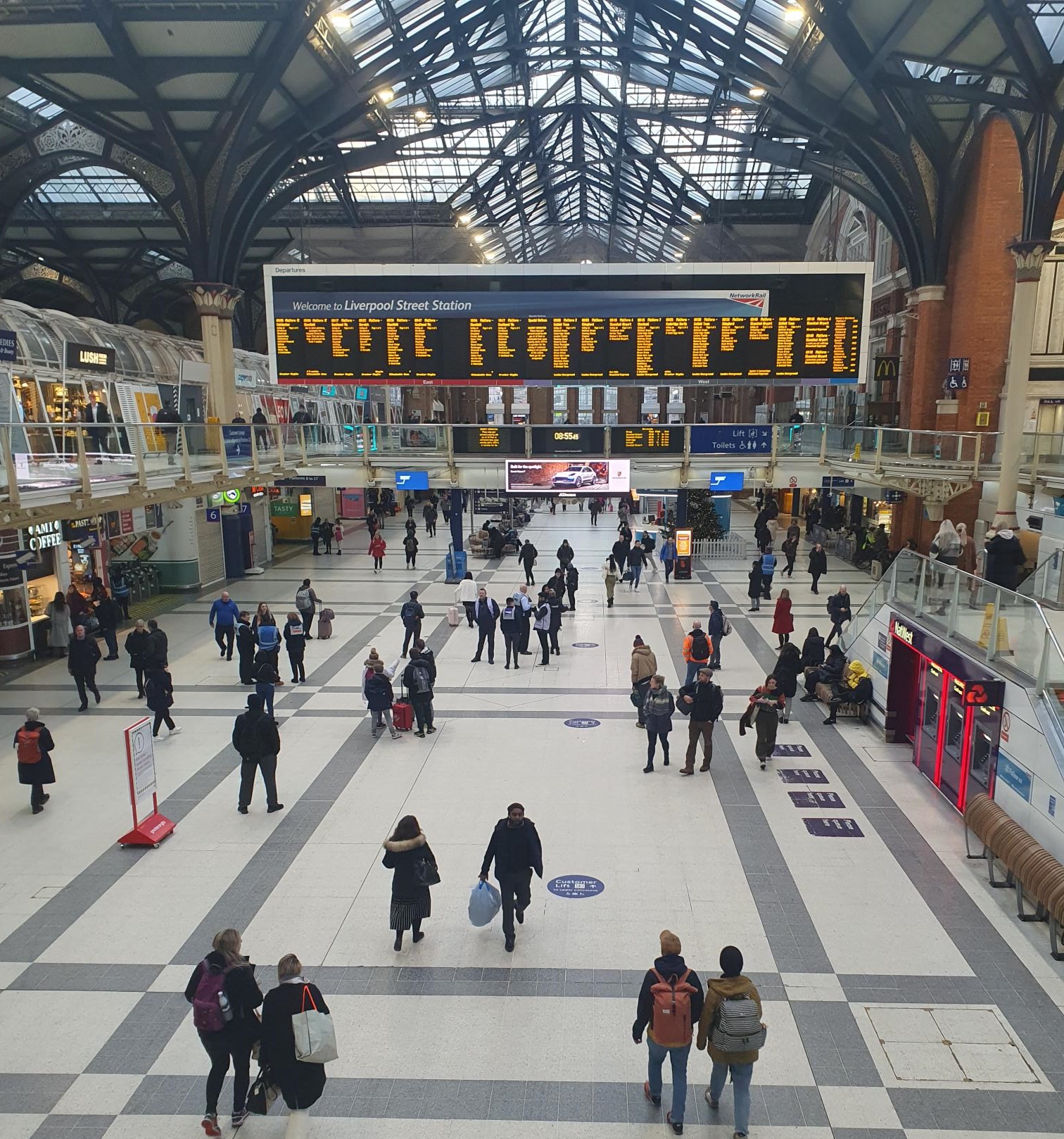
It was a similar story at both at in Manchester Piccadilly and Victoria. A small mercy, but we were pleased to see clear warnings on ticket machines to check that there is a train to your destination before buying a ticket.

Over at London Waterloo it was particularly quiet, not least because platforms seven to 15 were closed because of planned engineering works. There were notices around the station about the impact of the strike and there were plenty of staff available to help passengers.
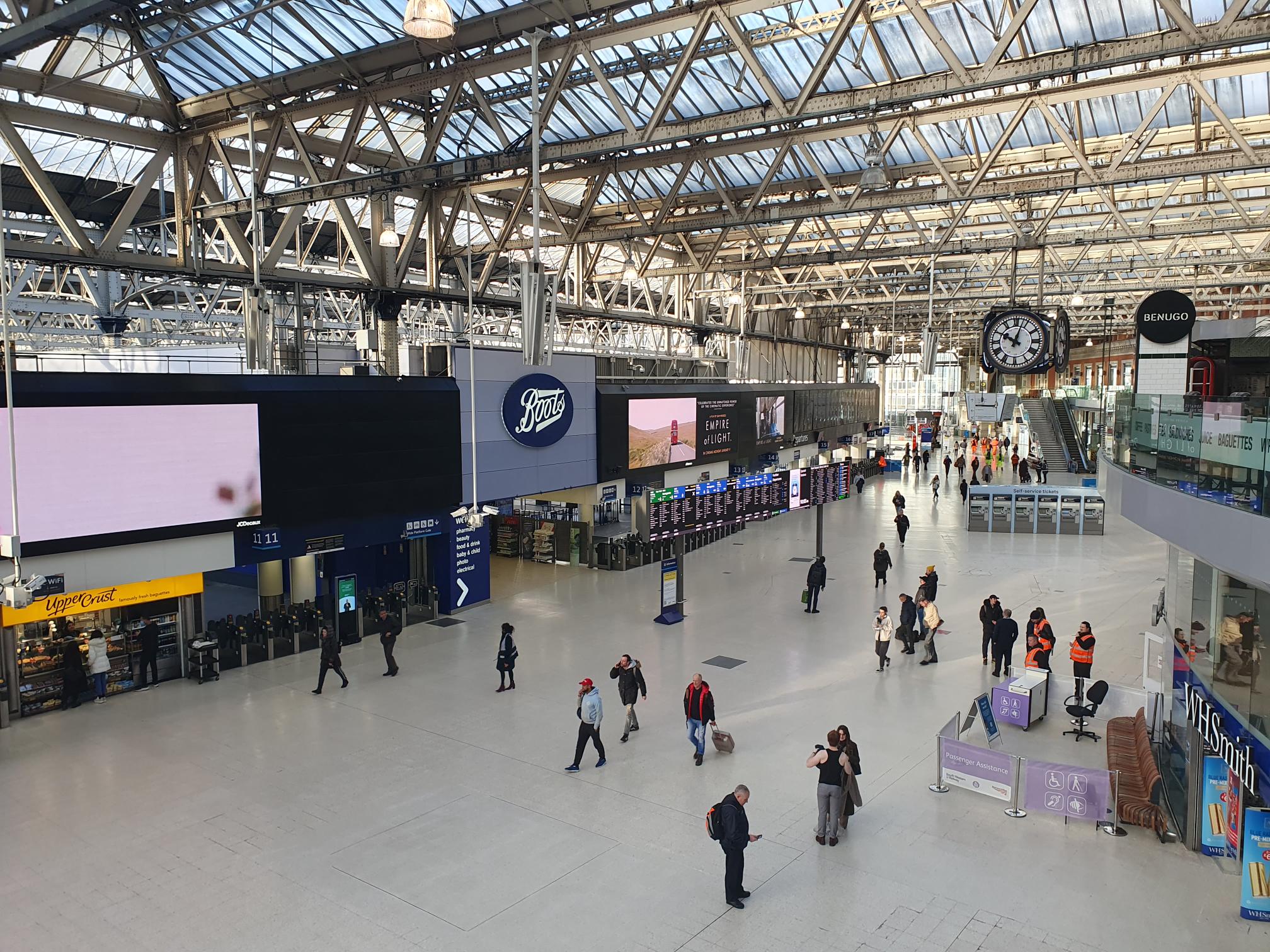
Tomorrow, Saturday 7 January, is the final day of the current strikes – dare we hope it will be the last?
If you’ve been affected, share your experiences by completing our short survey.
5 January
Passengers have just endured three days of strikes, with more to follow tomorrow and Saturday. Many lines have been shut entirely, and those that were open had far fewer trains than usual. Here’s what passengers have told us about the impacts on them:
“We were due to travel with Northern from Maryport to Newcastle, changing at Carlisle, then on via the LNER service to London. All Workington-Carlisle trains were cancelled so we had to get a taxi to Carlisle (for £80, probably four times the train fare). The whole journey was booked in two parts from LNER who did not tell us our Northern train was cancelled.”
“The journey was to get to work because of all the strikes I have used up nearly all of my holidays and had to take time off without pay”
“I have a £1,500 season ticket. In December out of 24 shifts they only got me to work twice. The strikes are bad but it is compounded by very late starts the next day for which there is no compensation. Not [that] the £6 would cover the £30 cost of a taxi to work.”
Friday 16 December
Passengers are enduring the second of the December 48-hour strikes. Many lines shut, and those that are open have fewer trains, starting later and finishing earlier than normal. Transport Focus was out and about today observing the situation for those who are travelling. At London Liverpool Street we found a sprinkling of passengers. Plenty of announcements and information warning passengers about early last trains. Good – one of our key recommendations.
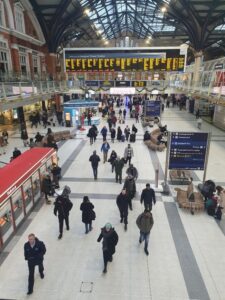
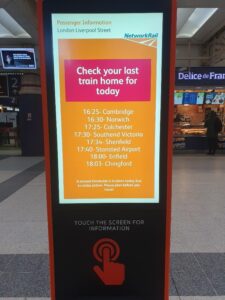
A Network Rail employee not on strike today was Stella, a hawk engaged in pigeon scaring duties.

Wednesday 14 December
It’s clear that lots of people are either not making journeys or finding other ways to travel. Transport Focus staff out and about on 13 and 14 December found fewer passengers than usual but people still travelling. The much-reduced service seemed to be running fairly well.
The situation at London Euston, London Waterloo and Manchester Piccadilly is pictured below.
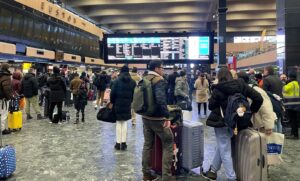
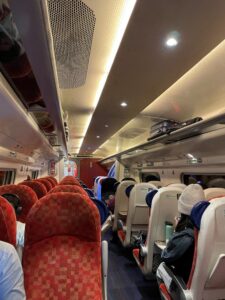
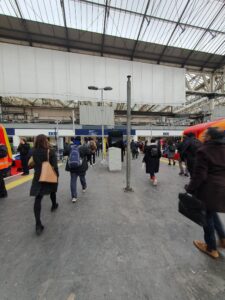
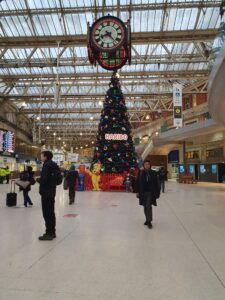
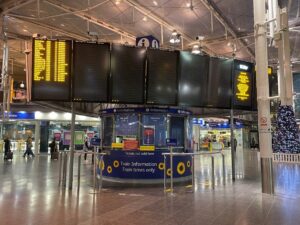
Tomorrow is not a strike day, but trains will start later than usual. But then Friday and Saturday are back-to-back strike days. Many routes will be shut, and the last train will be much earlier than normal on routes that are open. Passengers should check advice and timetables before travelling.
If you’d already bought a ticket for a strike day and didn’t travel, don’t forget to investigate getting a refund from the people you bought your ticket from.
Saturday 8 October
Today, members of the RMT and TSSA unions are on strike at most train companies. Trains within England, Scotland and Wales are all impacted with service reductions, late starts and early finishes. As a result there will still be some disruption tomorrow despite the strike ending tonight.
In our survey of around 2000 people ahead of the last strikes, we found 70 per cent were aware of the strike. A significant minority were unaware – is it a case of needing to do more to push messages, or ‘news fatigue’ meaning that people tune it out? We’re doing some work with passengers to explore the wording of disruption warning messages, to see what has the most impact.
Our survey also showed that around one in five planned to travel on the last strike day- and even more (just under three in 10) the day after. We’ve been out and about visiting stations for ‘on the ground’ feedback again. Our colleagues say that they have seen quite a few keen to travel and that, where trains are running, people clearly want to use them – for instance at Eccles and Corby.


A common theme throughout the disruption, in our passenger surveys and on-the-ground reports, has been patchy passenger information. Some are doing this well, others not. If further strikes are called we’ll be pressing trains companies to be clearer when last trains will run on strike days – and first trains when there’s a late start to the service.
We were pleased to see today that East Dulwich has taken on board our feedback and made some improvements to station information. And at Sunningdale signage gives the times of the first trains tomorrow. However at Corby there was a poster saying that the service has now finished, when it hadn’t. And there was no warning of last trains back being several hours earlier than is usual on a Saturday.
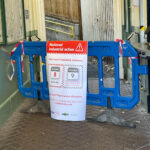
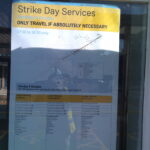
Wednesday 5 October
Today, members of the Aslef and TSSA unions are on strike at some train companies. Trains within Scotland and Wales are largely running normally, as are some in England including at c2c, South Western Railway, Southern and Thameslink. Other operators are providing a skeleton service or no trains at all.
Colleagues have been out and about today to check on the situation for passengers. As observed before, we’ve seen that many passengers have stayed away but trains on some routes have been busy.
As before, we’ve found a similar mix of good information and things that could be better. Being clear about last trains today and first services tomorrow still feels patchy.
At Southall, the Elizabeth line, which is not affected today, had good advance information about the strike on Saturday 8 October.
But at Telford, West Midlands Railway didn’t mention that Transport for Wales (TfW) trains were running – that is, not until we pointed out the omission.
At Bridgend, where there are no Great Western Railway trains today but Transport for Wales is running, we found there was robust information helping passengers understand the situation on different dates.
At Rose Hill Marple, which has no service today, good information was provided on the ticket machine.
And at London Liverpool Street the ticket machines had been labelled to encourage passengers to check they could get to their destination before buying a ticket.
Saturday 1 October
Today members of several rail unions were on strike. Ahead of this weekend we spoke to transport users about how this would affect their plans (read more here). We will follow up with them after the weekend.
We also reviewed operator websites and fed back where improvements were needed.
Today colleagues have been out to check on stations including East Dulwich, Ely, Paignton, Peckham Rye, Peterborough, Totnes and Woodley.

Printed information at Woodley station
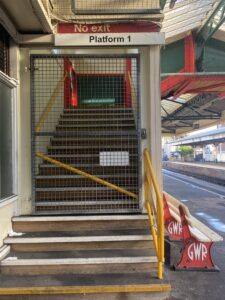
Blocked off stairs at Paignton
Overall it seems that where trains are running, people are still turning up and using them, although some of our colleagues encountered a few who had turned up with no idea about the strike.
On previous strike days we have highlighted pockets of poor information at stations. In some areas this is much better, although we still found room for improvement in others. We will be reminding operators about the need to provide information about all services running from their services, not just the ones they run. We’ve said this before, but it still seems to be a problem.
At Ely the station was fairly busy with half hourly services to Cambridge and London. Our colleague tried a ticket machine and it alerted her straight away about strikes and limited service (unlike Peckham Rye and East Dulwich, where we found no such warning). She said that there was good information elsewhere about first and last trains, but no mention that there were strikes coming up on Wednesday 5 and Saturday 8 as well.
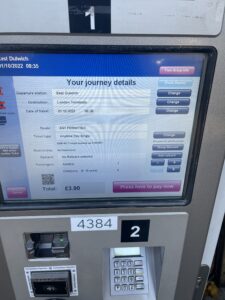
No warning on the ticket machine at East Dulwich
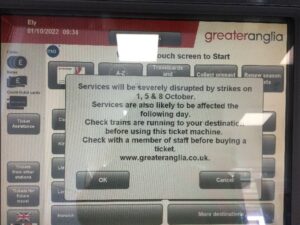
Warning on the screen at Ely
Our colleague in Totnes spoke to an ‘irritated’ passenger waiting for a train that wasn’t running. She was pleased to find the toilets and waiting room open. Although the ticket machine is out of order, there was a small paper notice about rail strikes. However these paper notices were only on one platform. Information screens on both platforms had updates.
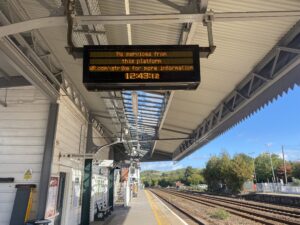
Overhead information screen with update at Totnes
Saturday 20 August
This is the second day that RMT and TSSA members working for Network Rail and a number of train companies are on strike.
We have been monitoring the passenger experience through mystery shopping reports, talking to our Transport User Panel and keeping an eye on social media. We also have a number of our staff who have been out and about to report back on the situation at stations.
Today we visited a number of stations, including Cheadle Hulme, Denmark Hill, Hove, Liverpool Street, Llansamlet and Rochdale.
We were pleased to find there were improvements in information compared to Thursday at Denmark Hill. There is now clear signage detailing the services running from there today. The story was similar at Cheadle Hulme where we found there to be good information.
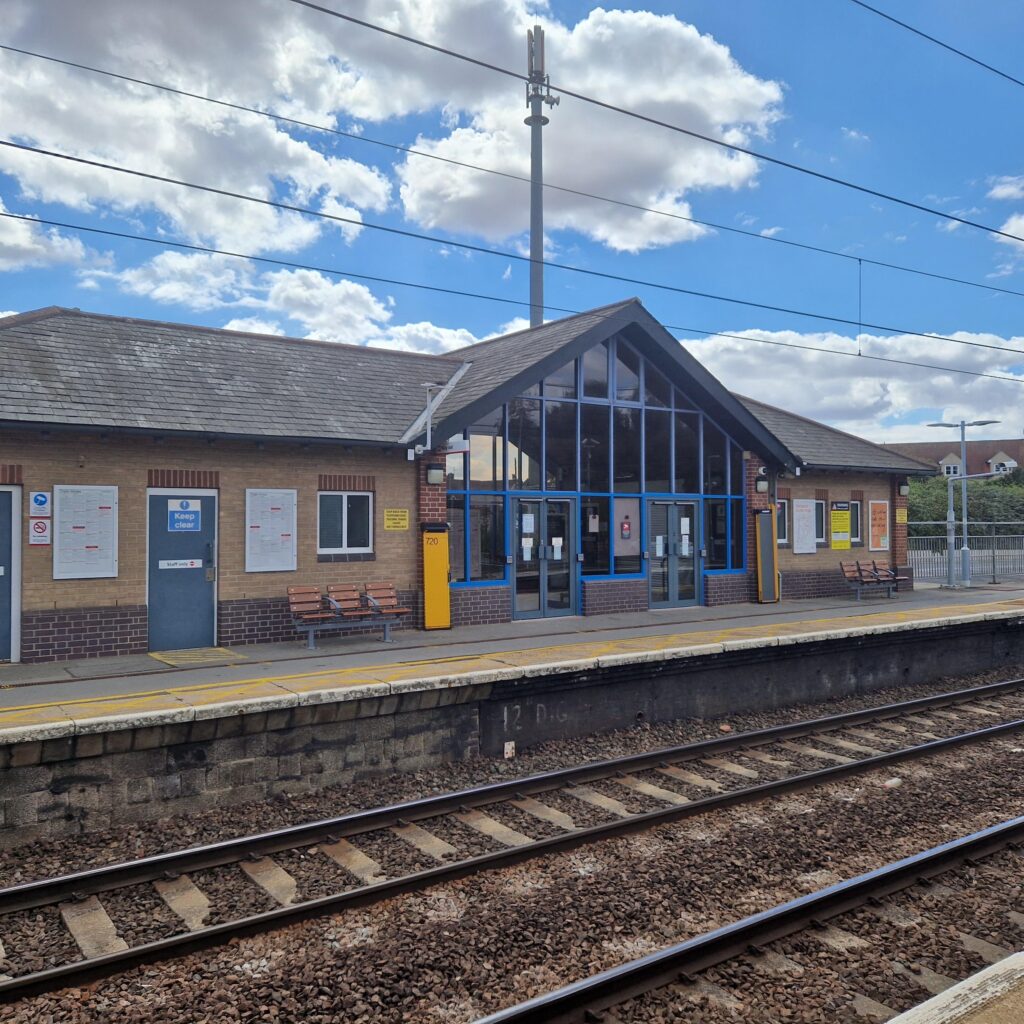
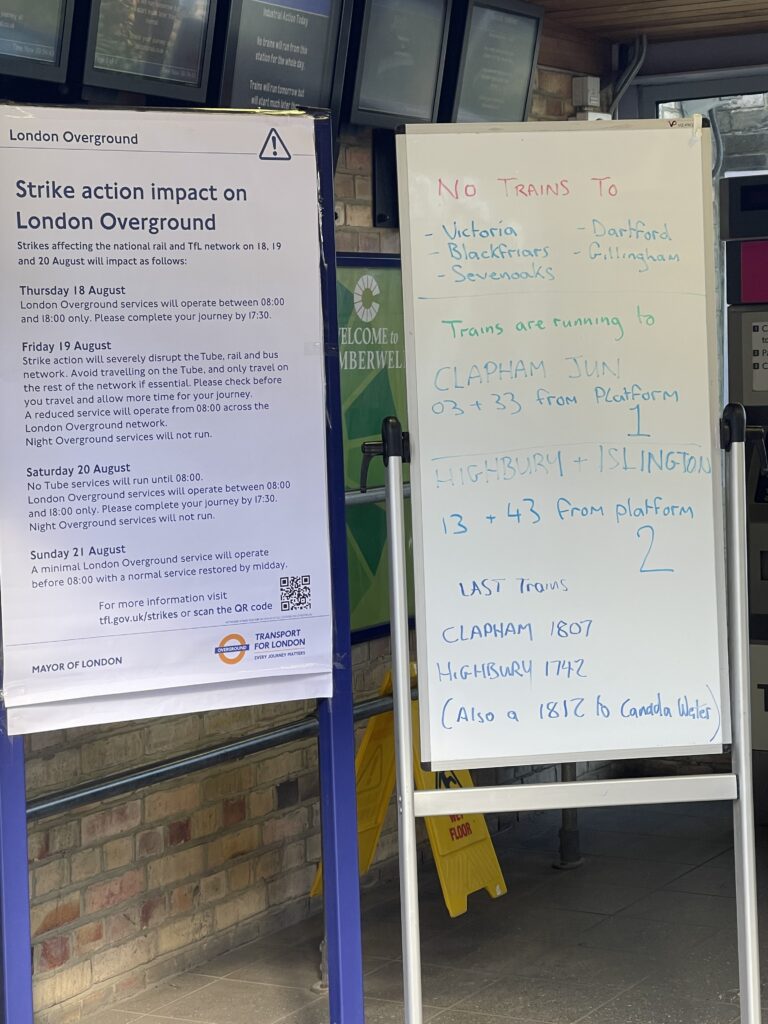
We also found slight improvements at Rochdale station which we had visited on previous strike days. However we would still like to see station specific information letting passengers know both in advance and on the day that there would be no trains at all from Rochdale. We noticed that some people turned up and looked confused when seeing the posters, indicating they were unaware of the strikes.
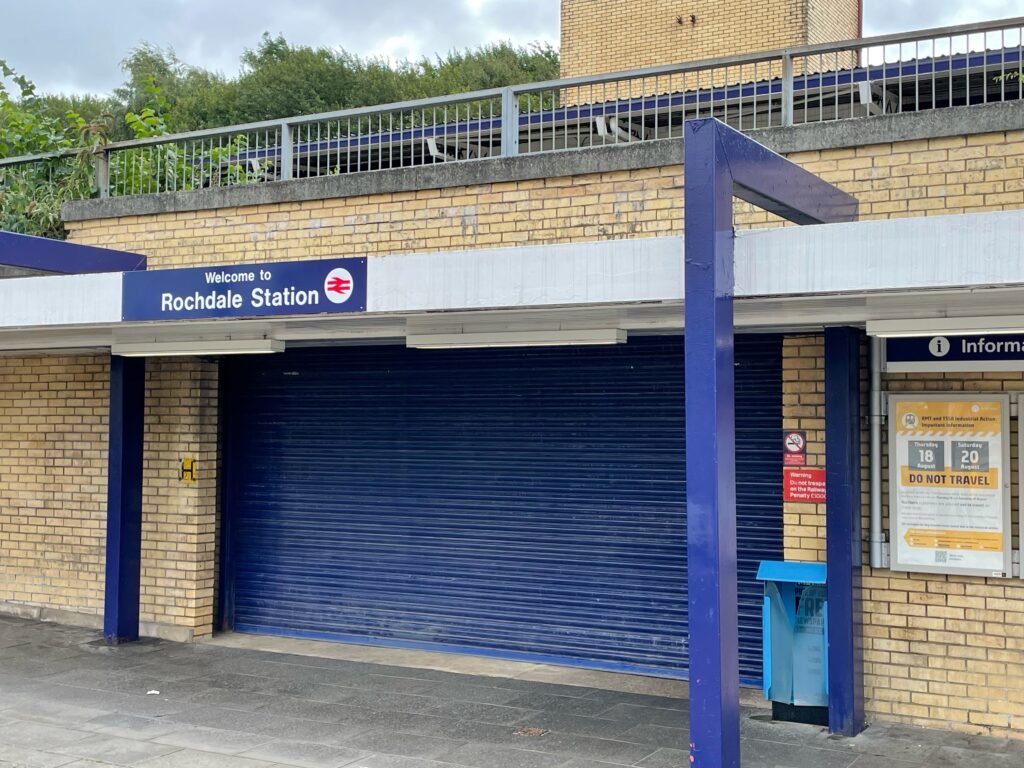
Hove station was moderately busy this morning but it was great to see lots of helpful and proactive staff around to help passengers. We did find there was a slight lack of information when approaching the station with no posters displayed around the car park, although there were some at the entrance.
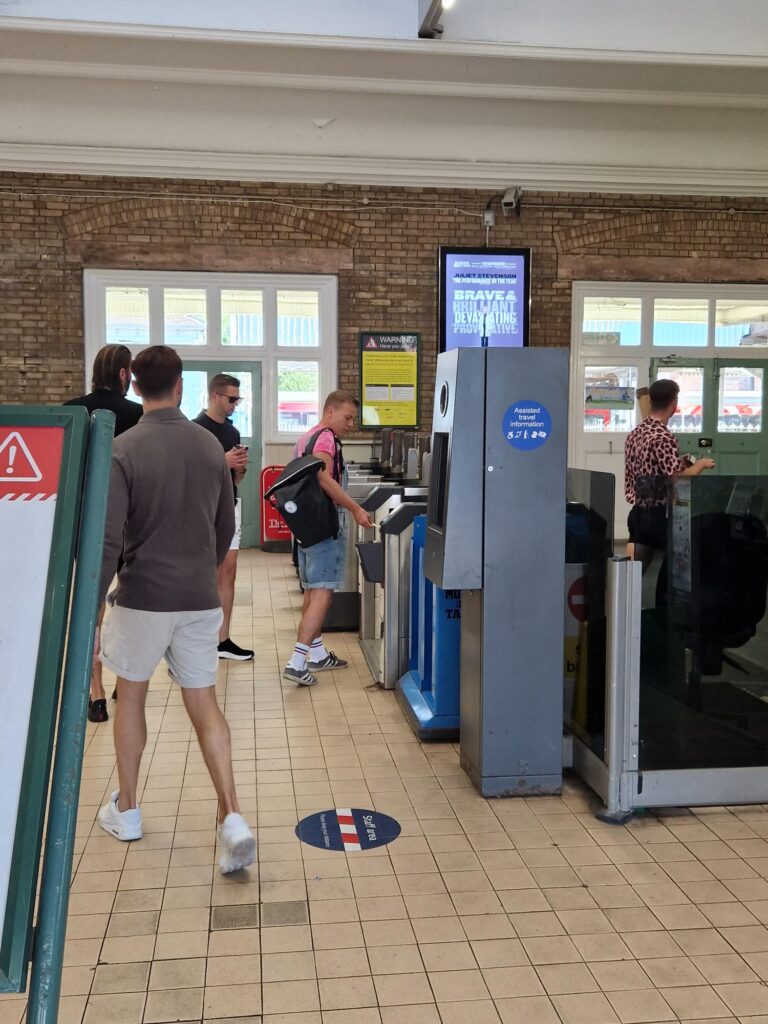
In Wales, we visited Llansamlet which is an unstaffed station. The customer information screens were switched off on both platforms and there were no audio announcements to inform passengers of the strike. Of the two entrances only one had a strike poster. We will feed back to improve the level of information here.
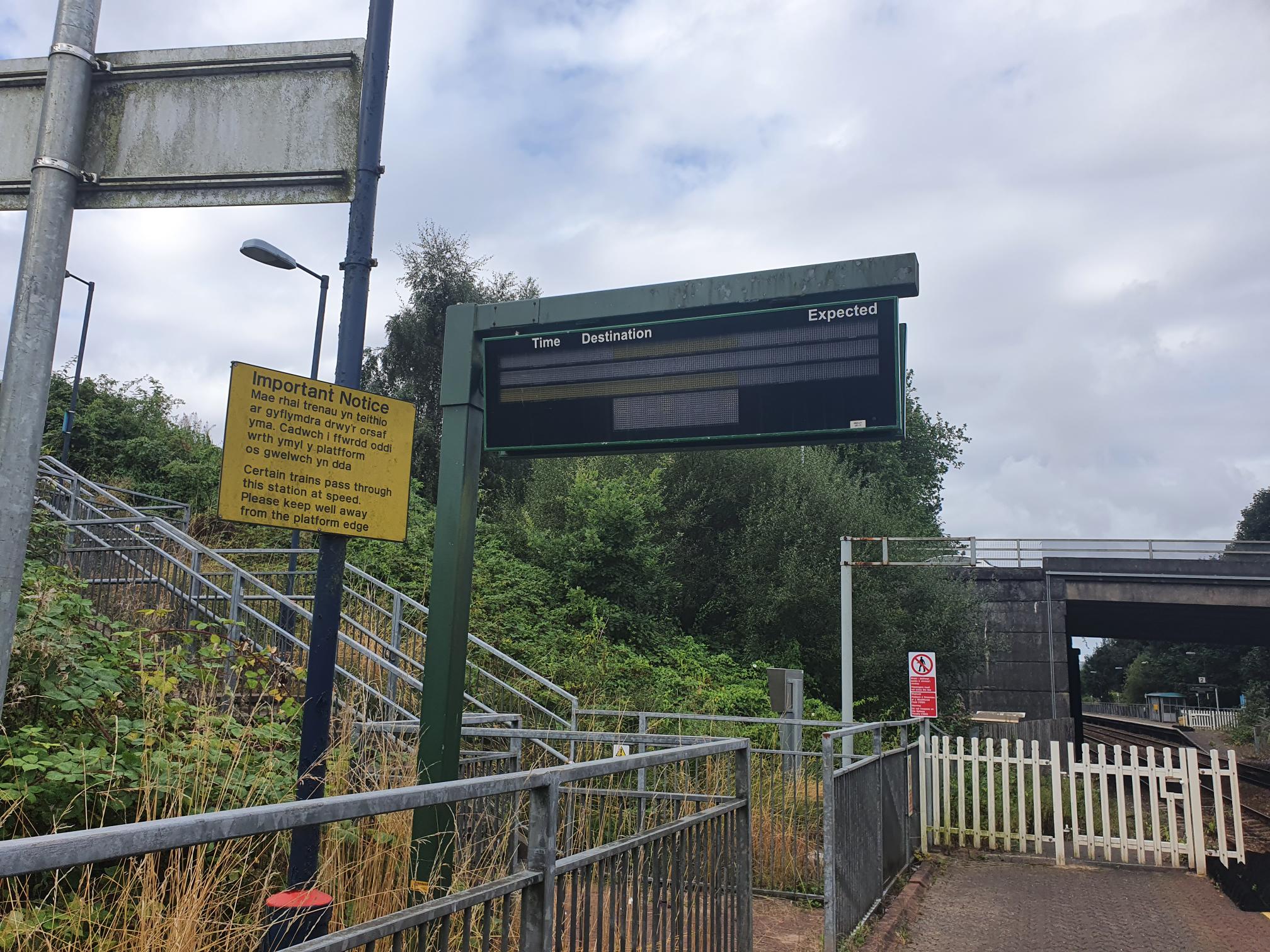
It was a better story at London Liverpool Street station where we found good signage upon arrival, information on last trains and plenty of staff on hand to help.
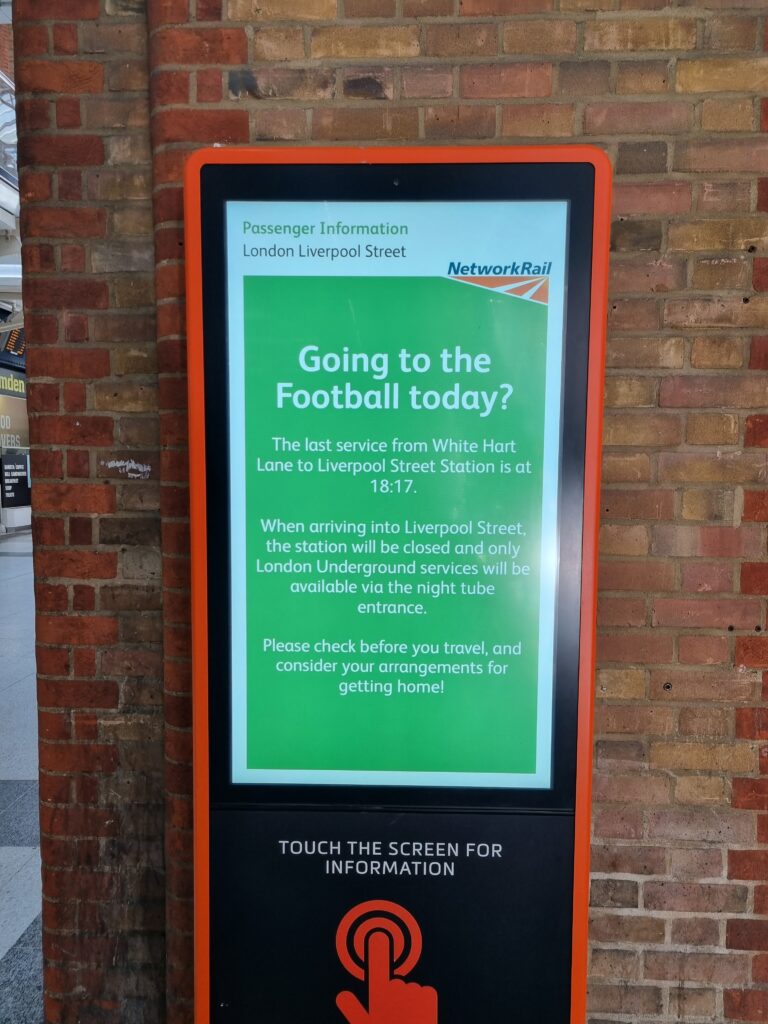
Thursday 18 August
Today RMT and TSSA members working for Network Rail and a number of train companies are on strike.
Transport Focus has commissioned mystery shopping reports, surveyed members of our Transport User Panel, will monitor social media, and has staff out and about reporting on the situation at stations.
We also spoke to a representative sample of more than 2000 people across Britain earlier this week. Of those people that had planned to travel by rail on affected days this week, the majority would no longer travel. However a third still planned to travel on the disrupted days after the strikes.
More than half (57 per cent) said information about train services that will and will not be running was good or very good – though just over a quarter (28 per cent) said it was poor or very poor.
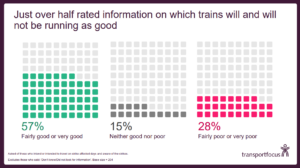
So far today we have visited Basingstoke, Bramhall, Manchester Piccadilly, Brighton, Denmark Hill, East Dulwich, Ely, Frome, Herne Hill, Hook, Levenshulme, Swansea and Westbury stations. Overall we have noticed that there are still areas where information is lacking.
At Bramhall, which has no services today, information screens were clear and well-placed, and ticket machines had plenty of strike information, although it was less obvious when trains will be running again. Our colleague spoke to two passengers there – one had forgotten about the strike but the other hadn’t been aware and was quite angry.
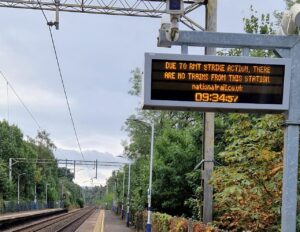
We flagged up that Ely could do better on this after the last strikes, and will highlight that would still benefit from more prominent signage. We also suggest a poster showing first service would be really useful for those planning to travel tomorrow, as there is currently no indication that tomorrow is affected. We were pleased to see at Ely that staff were on hand once again to help passengers. Our colleague reports seeing them proactively approaching people with information.
Denmark Hill had no posters or announcements about the fact there were no Thameslink or Southeastern trains. There were some posters about tomorrow’s overground disruption.
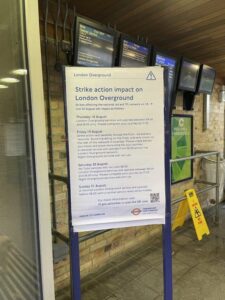
In Swansea, staff were on hand to provide local bus information for those who could take that alternative option. Also we spotted an improved poster with new yellow banner, following our feedback last time round. One passenger our colleague spoke to mentioned that she had bought her ticket that morning from the trainline website; we will be looking into this.
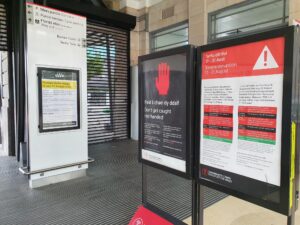
Saturday 13 August
Aslef members at Avanti West Coast, CrossCountry, Greater Anglia, Great Western Railway, Heathrow Express, Hull Trains, LNER, London Northwestern Railway, London Overground, Southeastern, Stansted Express and West Midlands Railway went on strike.
Transport Focus has commissioned mystery shopping reports, surveyed members of our Transport User Panel, will monitor social media, and has staff out and about reporting on the situation at stations.
So far today we have reports from Basingstoke, Ely, Peterborough and Stockport. There were some good examples of information, and some disappointing gaps.
Both Basingstoke and Ely stations had information on other strike days, but not today, even though Ely is particularly impacted. There was nothing on the screens there, nor any warning on ticket machines.
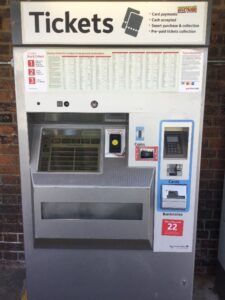
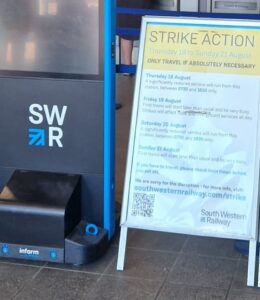
At Peterborough our colleague observed that the only information about last services were for those by LNER which runs the station. There was no information about last services for other operators such as Thameslink, CrossCountry, Greater Anglia and East Midlands Railway.
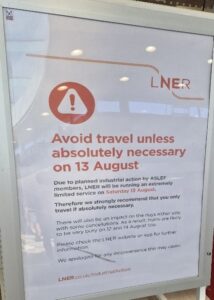
At Stockport there were posters letting people know about services are impacted by the strike today, including that trains are not going to all the usual destinations. There was also a good warning above ticket machines alerting people to check before buying tickets. Recorded PA announcements warned about strike action including potential disruption the day after the strike.
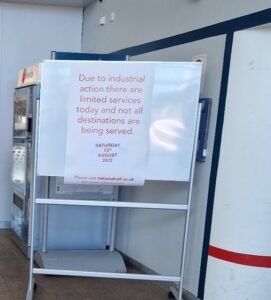
We were pleased to see staff on hand at all stations visited so far – a real help to those who hadn’t seen warning of the strike, or who simply had no option but to try to travel.
We will be talking to all operators about ensuring recorded announcements are clear, accurate and updated. And we will continue to press for visual information to be updated often. We’ve seen increasing use of QR codes to drive people online for latest updates. However this can exclude many who do not have access to smartphones, or enough data.
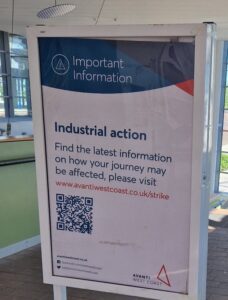
Look out for further updates on this website as we get more feedback and survey results.
Saturday 30 July
Today’s strike by ASLEF members affected Greater Anglia, Great Western, Hull Trains, London Overground, LNER, Southeastern and West Midlands Trains. This weekend sees the Commonwealth Games and the start of the new men’s football league season.
We continue to speak to passengers, and get out and about to monitor the situation on the ground. We have also asked some people who are making journeys anyway to ‘mystery shop’ their experience.
Today’s action had the potential to cause even more confusion as it did not affect all train operators and in fact some parts of the network were running as usual. However, while we saw the odd confused passenger, such as when we popped into Stafford station, on the whole things seemed to have been well communicated.
Overall we’ve seen a good staff presence at stations, which has been helpful to those who turned up unaware of the issues.
At Swansea one woman was trying to make her way to a surprise 80th birthday party in Birmingham. She said as she lives close by, she gets all her travel information from station posters; and there had been none at the particular entrance she uses. Staff helped her re-plan her route meaning she’d get to the party a bit later in the afternoon.
At Basingstoke there was no visible signage at all. It was better at Stafford, though some of it was on sliding doors which disappeared when they opened so not ideal placement!
We are also noticing more posters using QR codes to ensure that the information is the most current available. This is a good move, but must be backed up by regularly-refreshed signage for those who do not get their information in this way.
We are continuing to report specific issues to operators in the moment, and have been pleased to hear that things have been remedied. For example, where passengers search online for a service that is unavailable due to the strikes, the planner shows the next available which is the next day, but it isn’t obvious unless you check the date. This has now been highlighted.
Our spokespeople have been on BBC, Sky and GB News reminding people to check before they travel. We will publish a summary of our latest strike-day findings on our website in due course.
Wednesday 27 July
Train services are once again severely reduced today due to strike action by the RMT union.
This could prove tricky for people travelling to the France v Germany UEFA women’s semi final in Milton Keynes, or making their way to Birmingham ahead of the Commonwealth Games .
Transport Focus staff are out visiting stations to monitor the situation on the ground and reviewing the passenger information online. So far things have been fairly quiet, and we have seen some good examples of passenger information – but also some areas where there is room for improvement. Rochdale station, for instance, was completely closed with no explanation of why.
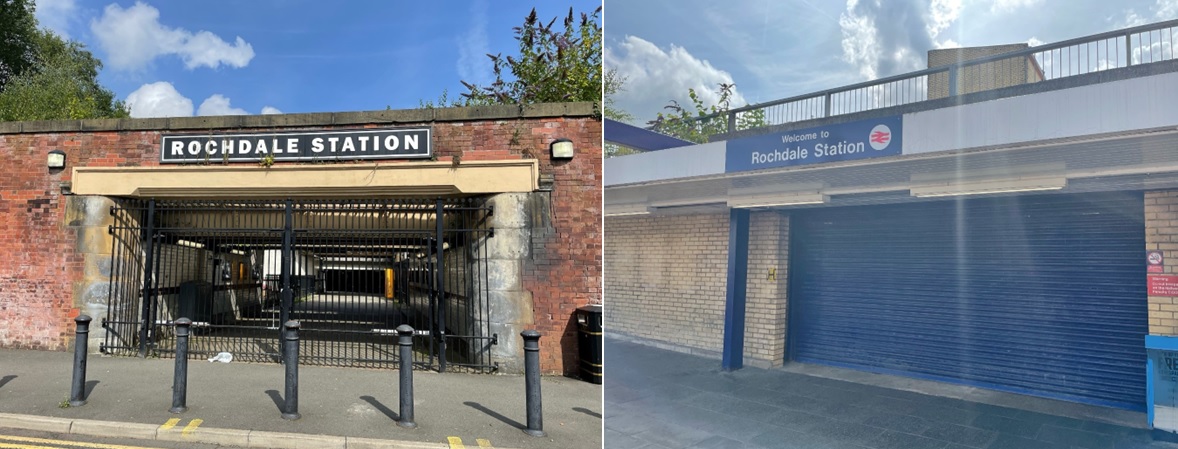
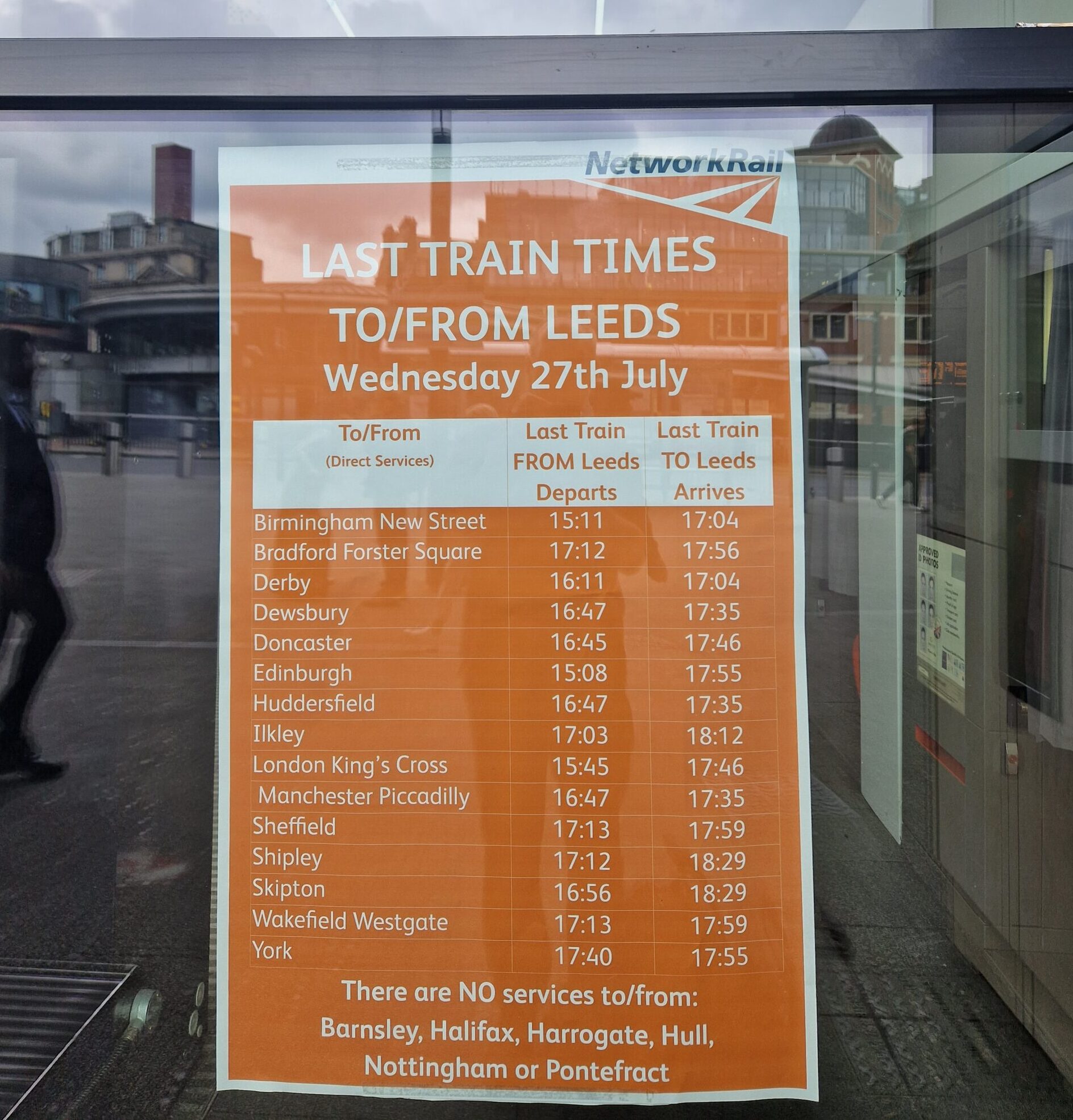
Good passenger information at Leeds station
So far it looks like many passengers have heeded the message to not travel by train, and stayed at home or made alternative travel arrangements.
Over the weekend we asked people about the impact. Around two in three (69 per cent) said they won’t now be travelling because of the strike. Some reported being unable to get work or having to work from home.
One passenger said: “I will be forced to rent a car, which is super bad for the environment but the rail companies leave me with virtual no other choice!”. Another said: “With the local buses on strike, and no transport of our own, we’re now stranded in our village.”
Watch this space for more information on the situation on the ground. We’ll be visiting stations this afternoon, and making sure there is good information on the last trains available. Saturday we will also have further updates about from the strikes (only affecting certain train companies) that day.
Saturday 25 June
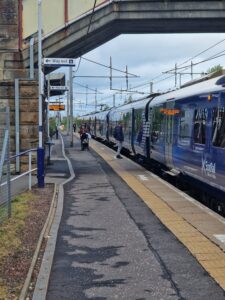 This is the first strike happening at a weekend, so there is more of an impact on leisure travel than commuters. We’ve been out observing the passenger experience at various stations.
This is the first strike happening at a weekend, so there is more of an impact on leisure travel than commuters. We’ve been out observing the passenger experience at various stations.
Similarly to earlier in the week there weren’t huge numbers travelling. But again, we found some were unaware of the strike – or what it meant for their journey.
There were a handful of people traveling from Wishaw to Glasgow early on. While at East Dulwich platforms had been barriered off as it had no trains today.
Elsewhere colleagues have commented on there being plenty of staff around helping passengers. And also that train companies should rethink where best to put strike information at stations so it has maximum impact. Hopefully there won’t be more strikes of course!
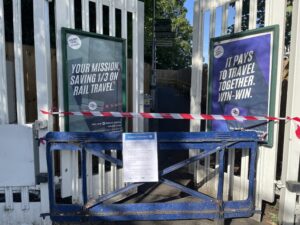 We’ve also popped in, so far, at Denmark Hill, Herne Hill, Motherwell, Penrith, Southall, Stafford, Wigan (North Western and Wallgate).
We’ve also popped in, so far, at Denmark Hill, Herne Hill, Motherwell, Penrith, Southall, Stafford, Wigan (North Western and Wallgate).
On Monday we’ll be taking stock of what we’ve learned in this difficult week for Britain’s rail passengers.
Friday 24 June
Today there is no industrial action, but fewer trains are running than normal. We’re hearing anecdotally that it’s similar to Wednesday in terms of numbers of people travelling (but more than on strike days).
We’re also hearing that staff availability at stations has been good. At Eccles, our colleague had a good explanation of the late start from a member of staff there, though they couldn’t see much info on display until they got to the platform. Over at Manchester Victoria (image left, below) another colleague found only one small notice about the train strike, although there were posters on lampposts outside both Victoria and Piccadilly. She said it was a little quieter than usual, and she didn’t notice any passengers looking stressed. There were plenty of staff on hand in high-vis.
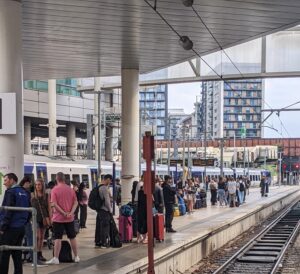
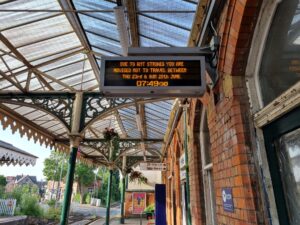
Similarly at Hale (image right, above) it was virtually empty with only two cars in the car park. Although the ticket machine had a warning sign, there wasn’t much other information. Our colleague saw some staff but said they didn’t seem to be offering help, even to two confused-looking passengers.
At an almost-empty Armathwaite services seemed to be running OK. And at Southall the info screens displayed a cancelled and a delayed service with no explanation or announcement as to why. Meanwhile at Manchester Piccadilly, the station felt busier with lots of holidaymakers and day trippers. Plenty of signs and staff were in evidence. A colleague at East Dulwich said the 7.38 London Bridge train that went through was full to standing room only.
As well as these station visits, we had people popping into Brighton, Cheadle Hulme, Clapham Junction and Crewe.
Transport Focus commissioned some people who were travelling anyway to ‘mystery shop’ their journey. Generally the feedback mirrored what we were hearing from our other work; things seemed to have gone ok, with mainly quiet trains and stations. Lack of announcements and posters/information at stations or on trains came up the most often. This evidence helps us add weight to our suggestions to industry around improving clarity and visibility of this information.
Some example journey reports are in the box above.
Tomorrow is another strike day with trains starting later than usual on Sunday as well. We’ll have people out and about, and will post an update here tomorrow. We’re also speaking to members of our panel, and running an omnibus survey, to find out how it went for those who travelled, and how it impacted those who didn’t. We will report back on this on Monday.
Thursday 23 June
This is the second day of strikes, the third of reduced services. We’ve been out to stations including Birmingham Snow Hill, Cannon Street, Fairfield, London Fenchurch Street, Shieldmuir, Southall, Stockport, Uddingston, Westbury and Wilmslow.
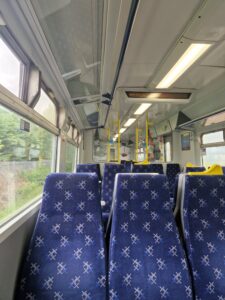
Overall it’s a similar picture to Tuesday with most people heeding the ‘do not travel’ guidance. Here’s the almost-empty train from Shieldmuir to Glasgow mid-morning today.
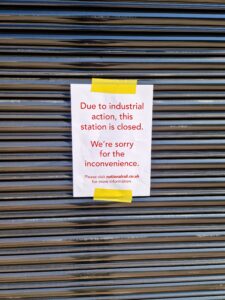
We’ve seen a good level of staff around in many places, to help and reassure those who have tried to travel. And, perhaps as a result of our feedback, we’re noticing more examples of prominent information at stations.
This was taken at Stockport this morning.
Yesterday we met two industry groups to discuss our suggestions for improvements to information and refund/compensation processes. The Customer Information Group is made up of heads of information across the industry, and the Redress & Support Group is the heads of customer relations.
We were pleased to see that National Rail Enquiries has heeded our advice and made it clearer that there are reduced timetables and a later start to service on days following strike action. Meanwhile South Western Railway will be putting a notice on ticket vending machines (TVMs) on future strike days.
On social media, the number of people talking about the strikes has dipped considerably. We found many tweets now are from people trying to get information.
@thetrainline
Hi 16:15 train from Leeds to Reading Sat 25th has been cancelled by LNER & not showing on your website, but still shows under my bookings and I’m unable to apply refund on site (needed urgently to fund petrol for daughters uni open day!). Tckt collect ref: BW72HLJT— Stu (@stupotwotnot) June 23, 2022
@SouthernRailUK when are you going to update your website with train times for Saturday? It’s 3 days away, so it would be nice to see what limited service you’re running so I can plan my journey home.
— Mark Harris (@arsenal_mjh) June 22, 2022
Our Transport User Panel members have been sharing their feedback from journeys made on Tuesday and Wednesday.
Things went fairly well for some:
- “I caught a train at 1546hrs, it was very lightly loaded.” (Tuesday)
- “Left late morning and returned earlier than normal to avoid early cut off of services. Trains weren’t very busy as nearly everyone that could worked from home.” (Tuesday)
- “I travelled at earliest poss 9.30 and was pleasantly surprised at its arrival on time and ease of journey. I had to travel in order to help someone with a homeless problem.” (Wednesday)
- “Slightly better today as the 0906 was running but that still meant being an hour later to work than normal (as again I usually get the 0806). Again work was understanding. Train home at the usual time was available. Train in the morning was busier than yesterday and 2-car but not overcrowded by any stretch.” (Wednesday)
But others report late cancellations or information issues. And some still hadn’t appreciated the reduced/late starting services:
- “Looked to get 09.27 to Wigan. Train showed on National rail planner and Trainline. Train cancelled. Had to travel by bus 4 hours.” (Tuesday)
- “I had a dental appointment on Tuesday. When the possible strikes were announced I changed it to midday on Wednesday. I discovered on Wednesday morning that there would be no trains until 1.30.” (Wednesday)
- “The journey so far is fine, however the LNER train should be going all the way to Inverness (it’s the 1200, the only direct LNER to Inverness) but it’s terminating at Edinburgh today and there’s no replacement bus to continue the journey so I’ve had to pay extra for a bus.” (Wednesday)
We also had some mystery shoppers reporting back on journeys made this week. We will be following up issues raised with the relevant operators, and will publish the reviews soon.
Wednesday 22 June
No strike today, but not quite ‘back to normal’. Yesterday was the first strike day but, as the industry warned, there is still not a full service running. Busy in places because of the late start to the service, but generally still quiet.
Our colleagues were out again, checking on information and staffing levels. Today we’ve been to stations including Bolton, Bramhall, Bredbury, Brighton, Chapel en le Frith, Clapham Junction, Disley, Fleet, Penrith, Peterborough, Stafford, Swansea, Westbury and Woodley.
We’ve highlighted some stations where information could be better or more visible, and fed that back to operators and Network Rail.
Following the website checks we did at the start of the week, we spoke to train companies, ticket retailers and information providers where we felt improvement was required. As a result:
- Greater Anglia now has PDFs of strike timetables on its website, with a link from the main strike information page
- Transport for Wales has added an explicit reference that season ticket holders not travelling on strike days should make a Delay Repay claim for a two-hour delay
- Trainline.com made it clearer that a reduced service will operate on the day after the strikes
- Red Spotted Hanky improved its banner to be clear that reduced service will operate on the day after the strikes.
Meanwhile on Twitter, we noticed a dip in the number of tweets on the topic – though still some strong feelings.
You’ve cancelled the 7.59 and 8.14 from pitsea to shoeburyness? How can the service be worse than yesterday on a day that was a strike. The next train is going to be rammed.
— John (@johnnyrae1) June 22, 2022
@LNER Thank you to Lyndsey and the other staff in the York Lounge and the staff on the 12:35 to Edinburgh for allowing me on an earlier train. Had to get a much earlier train from Leeds to York as half the Northern Trains are cancelled and I would have had a 3 hour wait.
— Brian (@Brian__Ives) June 22, 2022
Tuesday 21 June
Day one of the strikes. Overall things seem pretty quiet; people have heard the message to avoid travel if they can.
Some Transport Focus staff are visiting their local stations to monitor the situation on the ground.
Unsurprisingly really quiet at 8am at @NetworkRailMAN Looks to be as many staff on hand as there are passengers! Couple of people seeking advice. No access to upper level on station. Assume safety issue involving the escalators and stairs which were blocked off? @TransportFocus pic.twitter.com/w5W148IY4E
— David Sidebottom (@TF_davidS) June 21, 2022
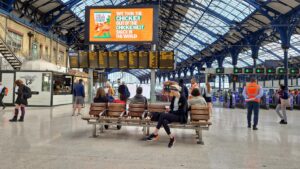 An early-morning visit to Brighton revealed a much quieter station than normal and plenty of staff on hand for those passengers who were travelling.
An early-morning visit to Brighton revealed a much quieter station than normal and plenty of staff on hand for those passengers who were travelling.
Meanwhile at Cannon Street in London, which is closed, it was eerily quiet… 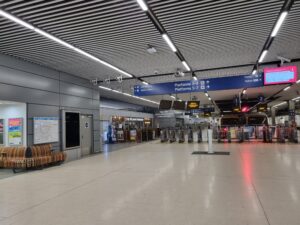
Another colleague who visited Fleet station for us reported that it looked like most people had stayed away and reverted to working from home.
However when we visited Wool, in Dorset, last night, we found no warning on ticket machines about not buying a ticket for the next day despite Wool having no trains – we’ve taken it up with South Western Railway. Just a simple sticker would help alert people. It is especially important in areas like this where there are tourists and holidaymakers that won’t have been glued to the news and may not even know there are strikes.
One Greater Anglia passenger reported that information about ticket validity during the strike had seemingly not reached station staff at Ipswich
@greateranglia GM. Your friendly and professional staff at ticket gates at IPS station are doing good job. However they’re unaware of the policy stated on your website: “Daily tickets can be used to travel the day before a strike day up to and including Tuesday 28 June.”
— Craig (@craigdinosaur) June 20, 2022
We’ve also asked those on our Transport User Panel, who had decided not to travel, about their experiences of getting a refund. One passenger said: “I have just done it – a bit laborious with having to cut up and photograph the tickets – seems a bit primitive, but it has been acknowledged so fingers crossed.”
Another reported issues with claiming for a refund on non-strike days when they have decided not to travel: “Cross Country have agreed to refund the cost of the ticket travelling out as that train is cancelled but refuse to refund the cost of the return journey for the return journey on 25 because the train will run. However I cannot use that ticket as I will have to travel to my destination (cricket match at Headingly) on the 23rd by car. They have suggested I travel earlier although will not of course pay any overnight costs. I think they are the only company behaving in this unreasonable manner.”
We’re also keeping an eye on social media:
So trains cancelled to London at weekend and need to now drive , can’t rearrange as got concert tickets , with the cost of fuel that’s going to be fun and as attempting refund from @Hull_Trains what an absolute joke !
— ALDO (@and_alan) June 21, 2022
Look out for more information on the situation on the ground and insight later this week as the strikes continue.
Monday 20 June
Tomorrow the rail strikes begin. We’re monitoring passenger experience throughout the disruption period with a household ‘omnibus’ survey to gauge mood and opinion before the strikes (results to be shared soon), feedback from our Transport User Panel (see below), mystery shopper visits to stations and website information reviews. We’ll be sharing findings throughout the week.
Today we heard from some panellists….
- “A colleague who would also have travelled by train, but – unlike me – owns a car has agreed to make a (quite large) detour to pick me up and get me home.”
- “Arranged a visit for 6 people to the British Museum to see a specific exhibition, Have cancelled tickets as 3 of the group have disabilities and cannot risk being stranded.”
- “Had a hospital appt for 9am on Tuesday. Travelling by car during the rush hour would be very time consuming and stressful, so intended to take the train and then bus. Still not prepared to drive, so have rearranged the appointment, but now have to wait for 7 weeks.”
- “As the train service is unlikely to run I will have to make the journey by bus. This makes a 20 minute journey take almost an hour in each direction. Also the timing of the train service is reliable (time wise) but the bus is likely to be delayed.”
- “Was going to catch train to Manchester Airport for holiday overseas. As train strike is on, will now travel by car & use parking, incurring additional parking charge, not expected initially.”

